|
|
|
|

|

|
|
 |
 |
| Leidy Yoana Acevedo Gutiérrez |
| Home
Country: |
Medellin, Antioquia - Colombia |
| Degree: |
University of Antioquia, Doctoral Student in Biomedical Basic Sciences emphasis Microbiology and Parasitology.
Master’s degree in biomedical Basic Sciences emphasis Tropical Medicine, Universidad de Antioquia, Medellín, Colombia, 2015 Bachelor’s degree. Microbiologist, Universidad de Antioquia, Medellín, Colombia, 2009
|
Supervisor:
Project Title:
|
Juan David Rodas González
Equines as sentinels of rickettsiosis in the northwestern of Colombia
|
|
|
|
Description
of the Project:Rickettsiosis is a reemerging and neglected zoonotic disease in Colombia of which its distribution is unknown. Studies on the topic have suggested that equines can be used as sentinels of the circulation of rickettsioses, for this reason, the goal of the project is to identify potential risk areas of circulation of tick-borne rickettsiosis in the northwestern region of Colombia using the equines as sentinels, with the purpose of establish preventive and control measures for this kind of disease. |
|
 |
| Dunstan Eugine Achwoka |
| Home
Country: |
Nairobi, Kenya |
| Degree: |
University of Nairobi Doctoral Student
MB ChB, Moi University, Eldoret, Kenya
MSc Global Health, Duke University, Durham, USA
|
Supervisor:
Project Title:
|
Dr Julius Oyugi
An assessment of Noncommunicable Disease (NCD) Care among People Living with HIV/AIDS (PLHIV) in Kenya
|
|
|
|
Description
of the Project:This study seeks to characterize the burden of four Noncommunicable diseases (cardiovascular diseases, chronic respiratory diseases, diabetes mellitus and cancer) that are responsible for over 80% of morbidity and mortality among PLHIV in Kenya. Additionally, this study will assess integration of NCD care within HIV settings through assessing outcomes of screening of precancerous lesions at a large prevention program in Nairobi, Kenya. The setting will be both PLHIV in care at both general population and key population clinics. The study will utilize retrospective program cohort data. Through this study, we will determine the burden of NCDs among PLHIVs in Kenya – both general and key populations and assess the benefit of NCD integrated care within HIV settings. We seek to obtain lessons to inform implementation considerations for NCD care delivery at ART clinics. |
|
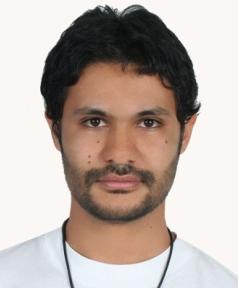 |
| Wbeimar Aguilar Jiménez |
| Home
Country: |
Urrao, Antioquia - Colombia |
| Degree: |
Universidad de Antioquia, doctoral student in Immunology focused Biomedical Basic Sciences
MSc - Immunology focused Biomedical Basic Sciences. Universidad de Antioquia. Medellín, Colombia
Bachelor in Sciences -Biologist Universidad de Antioquia. Medellín, Colombia |
| Supervisor: |
Dr. María Teresa Rugeles |
Project Title:
|
Association of variants in vitamin D pathway and innate immune response genes with natural resistance to HIV-1 infection
|
|
|
|
Description
of the Project: The HIV-1 highly exposed, but seronegative individuals (HESN) individuals make evident the existence of natural resistance mechanisms to HIV infection and they are an exceptional model for characterizing factors involved in this process. Several mechanisms of protection against HIV-1 infection have been characterized, however, these mechanisms do not explain the absence of infection in all HESNs. Hence, endogenous immunomodulators such as vitamin D should be considered as potential candidates influencing the risk of acquiring HIV infection. The role of Vitamin D during HIV-1 infection is not well documented, it could protect from HIV-1 infection in mucosa since it induces the expression antimicrobial peptides with anti-HIV-1 activity. The aim of this study is to establish an association between allelic variants in vitamin D pathway and innate immune response genes with resistance to HIV-1 infection, to measure mRNA levels of antimicrobial peptides in mucosa and to explore potential mechanisms of this association in HESN.
|
 |
| Juan Carlos Alzate Ángel |
| Home
Country: |
Envigado, Colombia |
| Degree: |
Universidad de Antioquia. Doctoral Student – Epidemiology
MSc Clinical Sciences. Universidad de Antioquia. 2016
Medicine. Universidad de Antioquia. 2002
|
| Supervisor: |
Dr. Carlos Alberto Rojas Arbeláez. MD, PhD |
Project Title:
|
Causes of acquired resistance to antiretrovirals in people living with HIV in Colombia
|
|
|
|
Description
of the Project: HIV infection is considered a chronic disease which is possible to control with antiretroviral drugs. These drugs are currently highly effective and safe for the patients. However, when adherence to the regimens are not complete, resistance to antiretrovirals can emerge. Although the main mechanism to this resistance is biological, because the cause are mutations in the HIV gene pol mainly, behind of this mechanism there are several issues that are important and relevant in the context of a disease with biological, personal and social factors that influence its evolution in every person in a different form. This project will evaluate a cohort of people living with HIV in 10 cities of Colombia that started their antiretroviral therapy between 2016 and 2020 to understand how these factors can be cause of acquired antiretroviral resistance.
|
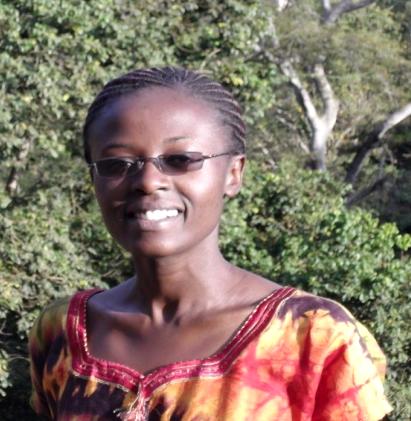 |
| Julie Ambia |
| Home
Country: |
Nairobi, Kenya |
| Degree: |
PhD student (University of Nairobi)
Masters of Public Health (University of Nairobi)
Bachelor of Science Nursing (University of Eastern Africa, Baraton)
|
| Supervisor: |
Dr Kawango Agot, Prof Joyce Olenja and Prof Omu Anzala |
Project Title:
|
Barriers and Facilitators of Adherence in User-Dependent Trials
|
|
|
|
Description
of the Project: To date, no single adherence intervention for oral PrEP and microbicides has been shown to be effective. However, several facilitators of and barriers to adherence have been identified across trials and in different geographical locations. These facilitators and barriers vary from place to place as well as from context to context. It is necessary to examine the facilitators and barriers within the Kenyan context in order to identify which ones are relevant and which ones are not, and to identify ways to minimize the barriers in future trials. It is for this reason that a study, to determine predictors of suboptimal adherence among trial participants in FEM-PrEP and Partners PrEP is proposed.
|
 |
| Winnie Apidi |
| Home
Country: |
Kenya |
| Degree: |
University of Manitoba, PhD candidate, Medical Microbiology
MSc. in health and Environmental Biotechnology, University of Nairobi
BSc. in Medical Laboratory Sciences, Jomo Kenyatta University of Agriculture & Technology, Kenya |
| Supervisor: |
Dr. Blake Ball and Dr. Frank Plummer |
Project Title:
|
The glycolysis pathway in HIV-1 resistance
|
|
|
|
Description
of the Project: Previous studies have shown down regulation of genes in key signaling pathways that HIV depends on for infection in HIV-1 resistant female commercial sex workers. One of the most under-exposed pathways was glycolysis/gluconeogenesis. My study aims at studying the difference in expression of glycolytic genes and enzymes in HIV resistant subjects and the adaptive immune response regulated by glycolytic metabolism.
|
 |
| Allison Balasko |
| Home
Country: |
Winnipeg, Canada |
| Degree: |
PhD Student, University of Manitoba, MD/PhD Progra
Honours Degree in Microbiology, University of Manitoba
|
Supervisor:
Project Title:
|
Dr. Keith Fowke
Investigating the lymphocyte-activation gene 3 (LAG-3) exhaustion marker and its associated defects in invariant Natural Killer T (iNKT) immune cell function in HIV infection
|
|
|
|
Description
of the Project: HIV is a global health issue, with 36.9 million HIV-infected people in 2018. HIV exhausts the infected person’s immune system to the point where it cannot properly fight infections. Understanding how to reverse this exhaustion is critical in enhancing long-term well-being of HIV-infected people. Previously, our lab has shown that a protein, lymphocyte-activation gene 3 (LAG-3), inhibits immune cells from functioning in HIV infection. Moreover, our lab has shown there is more LAG-3 on immune cells called invariant Natural Killer T (iNKT) cells of HIV-infected people. iNKT cells are essential to a healthy immune response; if iNKT cells do not function properly due to LAG-3, the immune system cannot work optimally. My project will determine if by blocking LAG-3, we will remove its exhaustive effects, allowing iNKT cells to work properly, helping to restore the immune system in HIV-infected people. |
 |
| Lisa
Marie Baspaly |
| Home
Country: |
Canada |
| Degree: |
BSc Biology- University of Winnipeg
MSc Entomology - University of Manitoba
|
Supervisor:
Project Title:
|
Dr. L. Robbin Lindsay
Vector competence of mosquitoes in Canada for West
Nile virus
|
|
|
|
Description
of the Project: The vector competence of ten mosquito species that have tested positive for West Nile virus in Canada will be assessed.
Vertical transmission and aspects of the effect of temperature on the extrinsic incubation period will also be examined for each species.
In the case of low or non-transmission, an attempt to identify the physiological transmission barrier will be made, via salivary gland and midgut dissection. |
 |
| Dione Benjumea Bedoya |
| Home
Country: |
Colombia |
| Degree: |
PhD - University of Antioquia, Public Health
Physician and Master in Epidemiology from University of Antioquia
|
Supervisor:
Project Title:
|
Dr María Patricia Arbeláez Montoya
Assessment of the effectiveness and adherence to treatment for latent tuberculosis infection in children under 5 years of age, household contacts of pulmonary tuberculosis patients in Medellín
|
|
|
|
Description
of the Project: Despite the availability of medicines for the cure of tuberculosis since 1940, TB remains a major cause of death from a single infectious agent worldwide. LTBI treatment for children under 5 years of age, household contacts of TB patients is an important measure for the control of tuberculosis in this age group, but it is unknown how effective this measure specifically in Medellin. The purpose of this study is to evaluate effectiveness and factors related to LTBI treatment adherence in children under five years of age, household contacts of pulmonary tuberculosis patients in Medellín. This new knowledge will strengthen the TB control program, for the management of children under 5 years of age, household contacts of pulmonary tuberculosis patients in his/her family and community. |
 |
| Catherine Card |
| Home
Country: |
Canada |
| Degree: |
University of Manitoba, PhD
Bachelor of Science in Microbiology from University of Manitoba
|
Supervisor:
Project Title:
|
Dr. Keith Fowke
Regulatory T cells and Immune Quiescence: a model for resistance to HIV infection
|
|
|
|
Description
of the Project: Emerging data from our lab suggests that resistance to HIV infection is associated with low levels of immune activation, a phenotype we have termed Immune Quiescence. My project focuses on the role that regulatory T cells play in controlling immune activation. We have shown that HIV-resistant commercial sex workers have elevated frequencies of regulatory T cells and lower frequencies of activated T cells. By reducing T cell activation, thus limiting the pool of susceptible target cells available for infection by HIV, regulatory T cells may play a key role in mediating Immune Quiescence and resistance to HIV infection. |
 |
| Claudyne Chevrier |
| Home
Country: |
Canada |
| Degree: |
University of Manitoba, Doctoral student
M.Sc. Santé communautaire, Université de Montréal, Montréal, Canada
B.Sc. Anthropologie, Université de Montréal, Montréal, Canada
|
Supervisor:
Project Title:
|
Dr. James Blanchard and Dr. Robert Lorway
Sexual and reproductive health of female sex workers in Winnipeg: an ethnographic exploration of their needs and choices
|
|
|
|
Description
of the Project: Considering that STIs and HIV can cause adverse pregnancy outcomes (including stillbirth, congenital syphilis and mother to child transmission of HIV), a better understanding of the reproductive healthcare needs and choices of FSWs is urgently needed. The same complex structural forces—including socioeconomic background, policy and legal contexts, and gender-based violence and harassment—that research has shown to make Canadian SWs more vulnerable to STIs and HIV infection, can lead to other sexual and reproductive health complications. In Winnipeg, programs and literature on the sex trade focus on “survival sex”, street-based sex work, and on children and adults who have been highly exploited or trafficked. However, little is known about adult SWs who neither seek to exit the trade nor define their practices in terms of “survival sex” or “exploitation”, as well as on SWs who operate in in-door (home, brothel and massage-parlour) settings or through the internet. Using a qualitative ethnographic approach, the proposed study will examine the sexual and reproductive health needs and choices of adult FSWs in Winnipeg. |
 |
| Nadia Chanzu |
| Home
Country: |
Kenya |
| Degree: |
University of Nairobi Institute of Tropical and Infectious Diseases, PhD
Masters of Science in Biomedical Science, Kingston University, London, UK
Bachelor of Science in Biochemistry from University of Nairobi, Kenya
|
Supervisor:
Project Title:
|
Prof. Walter Mwanda, Prof. Omu Anzala,and Dr. Julius Oyugi
Secretor Status, FUT2 Polymorphisms and the Risk of Infection by HIV and HPV in Female Sex Workers in Kenya
|
|
|
|
Description
of the Project: While blood antigens are often considered with regards to their expression on red blood cells, the secretor phenotype relates to the expression profile of blood antigens on the surface of epithelial cells and in mucosal secretions. This phenotype is determined by the ‘Secretor’ gene also known as the FUT2 gene; The FUT2 gene is of particular interest owing to the fact that there are now well established correlations between secretor status, FUT2 polymorphisms, and the susceptibility to bacterial and viral infections. Because of the importance of immunity to mucosal infections, my study will investigate the association between secretor status, FUT2 gene polymorphisms, and the risk of infection by HIV and HPV in a well-established high-risk population, female sex workers in Kenya.
|
 |
| Priyadarshini Chidambaram |
| Home
Country: |
Bangalore, India |
| Degree: |
2nd Year PhD Student
M.D. (Community Medicine), Madras Medical College, TN MGR Medical University, Tamil Nadu
M.B.B.S., Tirunelveli Medical College, TN MGR Medical University
|
Supervisor:
Project Title:
|
Dr. Krishnamurthy Jayanna
Effect of gender on utilization of antenatal care services in rural Karnataka, India
|
|
|
|
Description
of the Project: There are various drivers of gender-based health inequities in India present at the proximate, intermediary and macro –levels. A gender centric approach in maternal health including antenatal care is missing. In a country like India, the healthcare access to AN women is decided by family members like the husband and mother-in-law. This study tries to understand in these circumstances how gender influences antennal care access, how programmes and policy addresses gender and health workers comprehension of gender and its influence on field level service implementation.
|
 |
| Dhanunjaya Rao Chintada |
| Home
Country: |
India |
| Degree: |
Kuvempu University, PhD
Masters Degree in Social Work, Andhra University, DNR College of PG department, Bhimavaram, India
Field Leader in Public Health Fellowship from Center for Decease Control (CDC), USAID and PHMI
|
Supervisor:
Project Title:
|
Dr. Chandrashekar.E, Lecturer, Dept. of Adult Continuing Education, Extension and Field Outreach, Kuvempu University, Shankaraghatta
Interrelation between Stigma, discrimination and impact on utilization of care and support services- A study among HIV Seropositive Men having sex with Men and Transgender (MSM- T) in Karnataka
|
|
|
|
Description
of the Project: The proposed research is to study the Interrelation between Stigma, discrimination and impact on utilization of care and support services including HIV testing and disclosure, access to ART services and management of other opportunistic infections.
|
 |
| Suresh S Chitrapu |
| Home
Country: |
India |
| Degree: |
Kuvempu University, PhD
M. Phil in Social Work Vinayaka University Salem
PG diploma in Personal Management Bhavan’s University Mangalore
Master degree in Social Work (MSW) School of social work Roshani Nilaya Mangalore University; Bachelor of Arts in Vijaya College Mulki
|
Supervisor:
Project Title:
|
Dr. Chandrashekar.E, Kuvempu University, Shimoga Karnataka. India
A study on “Violence among women living with HIV AIDS in Karnataka
|
|
|
|
Description
of the Project: The study explores to obtain reliable estimates of the prevalence of different forms of violence against women living with HIV AIDS. The focus of this study is to document the health consequences of violence against women living with HIV (reproductive health, mental health, injuries, general use of health services). It also expected to reveal strategies adopted by women living with HIV to address the different forms of violence.
|
 |
| François (Frank) Cholette |
| Home
Country: |
Ottawa, Ontario, Canada |
| Degree: |
PhD Student, University of Manitoba
MPH, Department of Community Health Sciences, University of Manitoba
BSc – Biotechnology, Department of Applied Sciences, La Cité Collégiale
|
Supervisor:
Project Title:
|
Lyle McKinnon, PhD and Marissa Becker, MD FRCPC MSc
An integrated approach to understanding HIV transmission dynamics from viral genomic data.
|
|
|
|
Description
of the Project: Viral genomic analysis takes advantage of the relatively constant rate of HIV evolution over time and provides a useful snapshot of HIV transmission dynamics over time, geography as well as within and between population, which can be used to model potential interventions that could prevent future transmission events. By providing molecular linkages between infections, viral genomic analyses can add additional context to factors identified through behavioral modelling to improve overall efficacy of intervention strategies. However, many viral genomic studies focus on individual-level demographic and behavioral data despite the fact that biological, structural and environmental factors play a significant role in shaping transmission networks at the population level. My current research interests involve understanging HIV transmission dynamics among vulnerable populations using viral genomics based approaches that are congruent with broader, interdisciplinary, research programs seeking to address the national and global spread of infectious diseases like HIV.
|
 |
| Astrid Vanessa Cienfuegos Gallet |
| Home
Country: |
Colombia |
| Degree: |
University of Antioquia, PhD, Epidemiology
BSc Microbiology, University of Antioquia, Medellin, Colombia
MSc Biomedical Basics Sciences, University of Antioquia, Medellin, Colombia |
Supervisor:
Project Title:
|
Helena del Corral L., Ph.D and J. Natalia Jiménez, Ph.D.
Molecular epidemiology, clinical and economic outcomes of carbapenem-resistant Klebsiella pneumoniae, Enterobacter cloacae, Pseudomonas aeruginosa and Acinetobacter baumannii infections in five tertiary care hospitals in Medellín, Colombia.
|
|
|
|
Description
of the Project: Antimicrobial drug resistance is now recognized as a major threat to global health security with potentially devastating clinical and economic consequences. Amongst resistant microorganisms, carbapenem-resistant Enterobacter cloacae, Klebsiella pneumoniae, Acinetobacter baumannii and Pseudomonas aeruginosa have become a serious health threat worldwide due to their rapid spread in communities and hospitals. However, dissemination of resistance is difficult to assess because evidence from common surveillance systems is sparse and limited by unreliable phenotypic susceptibility tests, particularly in resource constrained settings. Hence, performance of research projects on the molecular epidemiology of resistant microorganisms contribute to more detailed knowledge on the emergence and spread of antimicrobial resistance mechanisms which helps to strengthen local surveillance programs and thus control antibiotic resistance efficiently. The research project of my thesis aims to describe the epidemiology and main resistance mechanisms of the four carbapenem-resistant bacteria listed above and to assess the impact of these infections on clinical and economic outcomes in five major hospitals in Medellín, Colombia.
|
 |
| Elizabeth Cooper |
| Home
Country: |
Canada |
| Degree: |
University of Manitoba,PhD
Previous degrees: Winnipeg, Manitoba. BA Adv. Religious Studies, University of Manitoba, MA, Native Studies, University of Manitoba |
Supervisor:
Project Title:
|
Dr. S Michelle Driedger, University of Manitoba
Culturally Relevant HIV/AIDS Prevention Programming within Canadian Aboriginal Contexts
|
|
|
|
Description
of the Project: Within the Canadian context, Aboriginal people represent 3% of the Canadian population, yet in 2002, they represented 28% of new HIV/AIDS diagnosis. Recognizing that historical trends and experiences, such as colonialism impact the way in which biomedicine is approached within Aboriginal contexts, the need for culturally effective interventions and clear communication strategies to present health-related information becomes of utmost importance. Health promotion begins with the premises that knowledge translation is important: beyond this, health promotion must recognize that what constitutes effective programming at one level of an intervention many not necessarily be the same for the different levels of programming. This project, in cooperation with non-profit health promotion organizations, will work towards narrowing this gap.
|
 |
| Angela Copete |
| Home
Country: |
Quibdó Colombia |
| Degree: |
University of Manitoba, doctoral student in Medical Microbiology and Infectious Diseases
Universidad de Antioquia, MSc Microbiology and Bioanalysis (2015)
Universidad de Antioquia, bachelor’s degree in Microbiology and Bioanalysis. 2011 |
Supervisor:
Project Title:
|
Dr. Zulma Vanessa Rueda, University of Manitoba
The silent impact of Mycoplasma genitalium, an emergent cause of sexual infections and increasing antimicrobial resistance profile in Canada
|
|
|
|
Description
of the Project: Mycoplasma genitalium (M.gen) is the leading cause of non-gonococcal and non-chlamydial urethritis and cervicitis. M. gen infections increase the risk of HIV acquisition, preterm delivery, spontaneous abortion, and infertility. Recently M.gen was included in the watch list of microorganisms with potential antibiotic-resistant increase. However, M.gen is not routinely screened in Canada, therefore the true prevalence of asymptomatic and symptomatic infections, antimicrobial resistance, and the diversity of strains circulating among people infected or colonized by M. gen remain unknown. The goal of my research is to determine the prevalence and diversity of M. gen among women, men, and gender-diverse people living with HIV (PLHIV) in Manitoba.
|
 |
| Kallesh Danappa Jayappa |
| Home
Country: |
India |
| Degree: |
University of Manitoba, PhD
Master of veterinary science, IVRI-Mukteswar, India. Bachelors of veterinary science, UAS-Bangalore, India. |
| Supervisor: |
Dr XiaoJian Yao, Medical Microbiology, University of Manitoba |
Project Title:
|
The molecular mechanism of HIV-1 nuclear import: the role of HIV-1 integrase in targeting host nuclear import machinery and delivering viral cDNA into nucleus.
|
|
|
|
Description
of the Project: The active delivery of HIV-1 cDNA into nucleus of infected cells by hijacking the host nuclear import machinery is a unique characteristic that distinguishes HIV-1 from some of other retroviruses. The nuclear import of viral cDNA allows HIV-1 to infect terminally differentiated macrophages as well as dividing CD4+ T-cells at interphase; contributing to the tremendous replication potential of HIV-1, as evident in infected individuals. However, the interplay between viral/cellular factors and the underlying molecular mechanism of HIV nuclear import is still not clear. My study is aimed at elucidating the key nuclear import factors targeted by HIV-1 IN for successful delivery of viral cDNA into nucleus, and their molecular mechanism of interaction. The proper understanding of HIV-1 nuclear import would help to design novel anti-HIV strategies that terminate viral replication at a step prior to integration and strengthen the present anti-HIV treatment regimen.
|
 |
| Tejaswini B Darukaradhya |
| Home
Country: |
Bangalore, India |
| Degree: |
1st Year PhD Student, M.S. Ramaiah University of Applied Sciences, Bengaluru, Karnataka, India
M.D.S (Public Health Dentistry), Faculty of Dental Sciences,
MS Ramaiah University of Applied Sciences, Bengaluru, Karnataka, India
M.S (Counselling and Psychotherapy), Kuvempu University, Shimoga, Karnataka, India
B.D.S, M.S Ramaiah Dental College and Hospital, Rajiv Gandhi University of Health Sciences, Bengaluru, Karnataka, India |
| Supervisor: |
Dr. Krishnamurthy Jayanna |
Project Title:
|
Socio-cognitive Theory approach to Improve Healthy Lifestyles and Behaviors among Adolescents as part of primary NCD Programs in South India
|
|
|
|
Description
of the Project: Noncommunicable diseases (NCDs) are a global health challenge and a threat to mankind. In India also, there is gradual shift in disease trends towards such chronic lifestyle diseases being multifactorial with more focus on behavioural riskfactors. These behavioural riskfactors are rooted in adolescents and young adults predisposing to the development of NCDs. Hence adolescents and young adults being identified as a major at-risk group needs behavioural change intervention very early. Such behavioural intervention based on Social-cognitive theory (SCT) in program planning for health promotion and disease prevention will have bigger impact on rest of their life. This study tries to review existing efforts of health systems and national programs to address individual behaviours and also to assess the effectiveness of SCT approach implementation as part of primary NCD Programs in improving healthy lifestyles and behaviours.
|
 |
| Arup Kumar Das |
| Home
Country: |
India |
| Degree: |
International Institute for Population Sciences, PHD program
|
Supervisor:
Project Title:
|
International Institute for Population Sciences, PHD program
Psychosocial, Behavioral and Contextual Determinants of STI/HIV Vulnerability among Female Workers in Bars: A life cycle approach
|
|
|
|
Description
of the Project: A significant proportion of girls working in the Bars of Mumbai are also involved into sex work and have a different characteristic in comparison with the other non-brothel based sex workers. Deep-rooted poverty at the peripheral states and other countries creates a complex social environment, which tended them to migrate to Mumbai. Over time, factors such as higher aspiration to earn quick money and greater demand for sexual services due to presence of large number single male migrants increase their risk taking attitude and behavior. Subsequently, a lower capacity to adopt safe sexual practices increases their vulnerability of STIs/HIV and expected to contribute significantly in the existing pace of the epidemic in the city of Mumbai Under this backdrop the proposed to explore how individual level behavioral risk factors are influenced by psychosocial, structural and contextual factors. |
 |
| Taylor Davedow |
| Home
Country: |
Winnipeg, Manitoba, Canada |
| Degree: |
University of Manitoba, 2nd year PhD student
MSc (Food Science) – University of Manitoba
BSc (Food Science) – University of Manitoba
|
Supervisor:
Project Title:
|
Dr. Celine Nadon
Genomic insights into Vibrio cholerae non-O1/non-O139 and the development of novel laboratory-based surveillance systems
|
|
|
|
Description
of the Project: Cholera remains a disease of international importance. Vibrio cholerae serotypes O1 and O139 are solely responsible for seven pandemics to date, and have been widely studied. However, there are >200 other serogroups that cause sporadic cases or small outbreaks of foodborne illness around the world. The aim of this project is to undertake comparative genomic analysis of non-O1/non-O139 Vibrio cholerae to characterize virulence markers and reveal phylogenetic relationships within Canada and internationally. With this information, we expect to bring to light previously unrecognized outbreaks and linkages to the global food supply. |
 |
| Katherine Dayanna Laiton Donato |
| Home
Country: |
Bogotá Colombia |
| Degree: |
Universidad de Antioquia, doctoral student in basic biomedical sciences – virology
Bachelor’s in microbiology, Universidad Colegio Mayor de Cundinamarca and master in microbiology, Universidad Nacional de Colombia
|
Supervisor:
Project Title:
|
José Usme Ciro
Characterization of emerging RNA viruses and with emerging potential present in sylvatic, rural and urban environments of Colombia
|
|
|
|
Description
of the Project: Identify and characterize emerging RNA viruses with emerging potential in sylvatic, rural and urban environments in Colombia. 1. To evaluate the phylogenetic relationships and evolutionary mechanisms that shape the genetic variability of SARS-CoV-2 in Colombia.
2. Establish phylogenetic relationships and describe potential transmission scenarios of RNA viruses identified in urban, rural and sylvatic environment.
3. Evaluate through in vitro tests the emergence potential of RNA viruses identified in the ecosystem of the Sierra Nevada de Santa Marta.
4. Establish methodological strategies for genomic surveillance of emerging viruses with impact on public health. |
 |
| Elsabé du Plessis |
| Home
Country: |
Born in South Africa |
| Degree: |
University of Manitoba, PhD student
BA (Hons) Psychology from Stellenbosch University (South Africa)
M.Sc in Community Health Sciences (University of Manitoba)
|
Supervisor:
Project Title:
|
Dr. Robert R Lorway and Dr. Sharon Bruce
HIV vaccine acceptability among vulnerable populations in Kenya
|
|
|
|
Description
of the Project: A vaccine that could safely and effectively prevent infection with HIV would benefit groups most affected by the disease - such as female sex workers (FSW) - since it would provide a prevention method within their control that did not need negotiation at every sexual encounter. These women are over-represented in new HIV infections partly due to stigma, discrimination and other socio-political factors. Though Kenya’s HIV epidemic is considered to be “generalized” with 7.8% of the general population estimated to be infected, FSW still account for a disproportionally high number of new infections, up to seven times higher than in the general population. Although these groups would benefit greatly from a future HIV vaccine we lack the knowledge for planning effective vaccination campaigns. The proposed project will examine the political, social and historical processes that have shaped health disparities in Kenya and influences people’s perceptions and use of healthcare and HIV prevention services to inform future program planning. |
 |
|
| Sumit Dutta |
| Home
Country: |
India |
| Degree: |
Dr. K. N. Modi University, India, doctoral student
B.A. English (Honours), University of Delhi
M.A. Sociology from IGNOU |
Supervisor:
Project Title:
|
Dr. Robert R Lorway
Following the Divine in a time of AIDS: Jogappas Confronts the HIV Epidemic in Karnataka
|
|
|
|
|
|
|
Description
of the Project: The study intends to generate new knowledge about the highly marginalized and socially disenfranchised Jogappa community. This indigenous group (Jogappa) has been largely ignored in the social science and public health literature in comparison to other sexual and gender minority communities. They found little or no mention in the vast literature concerning sexual and gender minority vis-à-vis transgender community. The study holds the potential to make a unique contribution to gender and sexuality studies in Southeast Asia. Furthermore, and more urgently, this study will generate invaluable demographic and health information that will enable policy makers to address the specific social and health inequities encountered by these communities. |
 |
|
| Jasmine Frost |
| Home
Country: |
Manitoba, Canada |
| Degree: |
University of Manitoba, Medical Microbiology and Infectious Diseases, PhD
M.Sc. in Microbiology- University of Manitoba
B.Sc. in Microbiology- University of Manitoba |
Supervisor:
Project Title:
|
Dr. Alberto Severini
Investigation of mumps outbreak trends in Canada through whole genome sequencing and testing of vaccine cross-reactivity to the current circulating mumps strain
|
|
|
|
|
|
|
Description
of the Project: The Measles, Mumps, and Rubella (MMR) vaccine was introduced in to Canada’s vaccination program in 1983, and yet mumps has remained endemic with a recent resurgence affecting mostly young vaccinated adults. This project aims to fully investigate the mumps epidemic in Canada to provide critical information that will influence future vaccination and outbreak policy to eliminate endemic mumps from Canada. Whole genome sequencing will be used to determine virus evolution and mutation rate. This data will be paired with epidemiological data such as age, sex, and geographical location to try and identify populations who may be more at risk during a mumps outbreak. Additionally, the current vaccine (genotype A) will be tested for its efficacy to give rise to neutralizing antibodies against the current circulating mumps strain (genotype G). |
 |
|
| Amaanat Gill |
| Home
Country: |
Manitoba, Canada |
| Degree: |
MSc. Community Health Sciences, University of Manitoba
BSc (Honours) Life Sciences and BA (General) Global Development Studies at Queen’s University |
Supervisor:
Project Title:
|
Drs. Marissa Becker and Lyle McKinnon
Examining the changes in the uptake/use of HIV and other STBBI prevention and treatment services by female sex workers in Nairobi, Kenya during the COVID-19 pandemic.
|
|
|
|
|
|
|
Description
of the Project: The COVID-19 pandemic has introduced a multitude of public health restrictions globally. Prevention and intervention strategies for containing COVID-19 have included closure of non-essential services, lockdown measures, and physical distancing guidelines. Current existing literature suggests that the COVID-19 pandemic has presented a multitude of challenges for sex workers and the sex work industry in Kenya. A number of studies have highlighted the difficulties faced by female sex workers in accessing sexual and reproductive health services due to lockdown protocols and social distancing guidelines, which includes challenges in accessing HIV treatment and prevention resources. My project aims to determine if there have been any changes in the uptake/use of HIV and other Sexually Transmitted Bloodborne Infections (STBBI) prevention and treatment resources among female sex workers in Nairobi, Kenya during COVID-19 by utilizing secondary data from the Sex Worker Outreach Clinics in Nairobi. |
 |
|
| Shanelle Gingras |
| Home
Country: |
Winnipeg, Manitoba, Canada |
| Degree: |
University of Manitoba, PhD, year 4
Biology Degree, Pre-Master’s Medical Microbiology and Infectious Diseases – U of M |
Supervisor:
Project Title:
|
Dr. Paul McLaren
Genetic regulation of gene expression differences in inflammatory cells and its impact on HIV susceptibility
|
|
|
|
|
|
|
Description
of the Project: Genital and systemic inflammation have been identified as key factors in women’s risk of HIV acquisition. Furthermore, inflammation has been known to reduce the efficacy of pre-exposure prophylaxis medication, damage the mucosal barrier within the vaginal tract, and attract HIV target cells. External factors (i.e. sexually transmitted infections, bacterial vaginosis, menstrual phase, etc.) that contribute to this inflammation have been well studied, however the contribution of internal genetic host factors have not been elucidated to date. My project is investigation genetic regulation of gene expression in inflammatory cells and its impact on HIV susceptibility in a cohort of South African women. My project serves to answer key questions surrounding host genetic variation of inflammation in relation to HIV acquisition and increase genomic research in underrepresented African populations. |
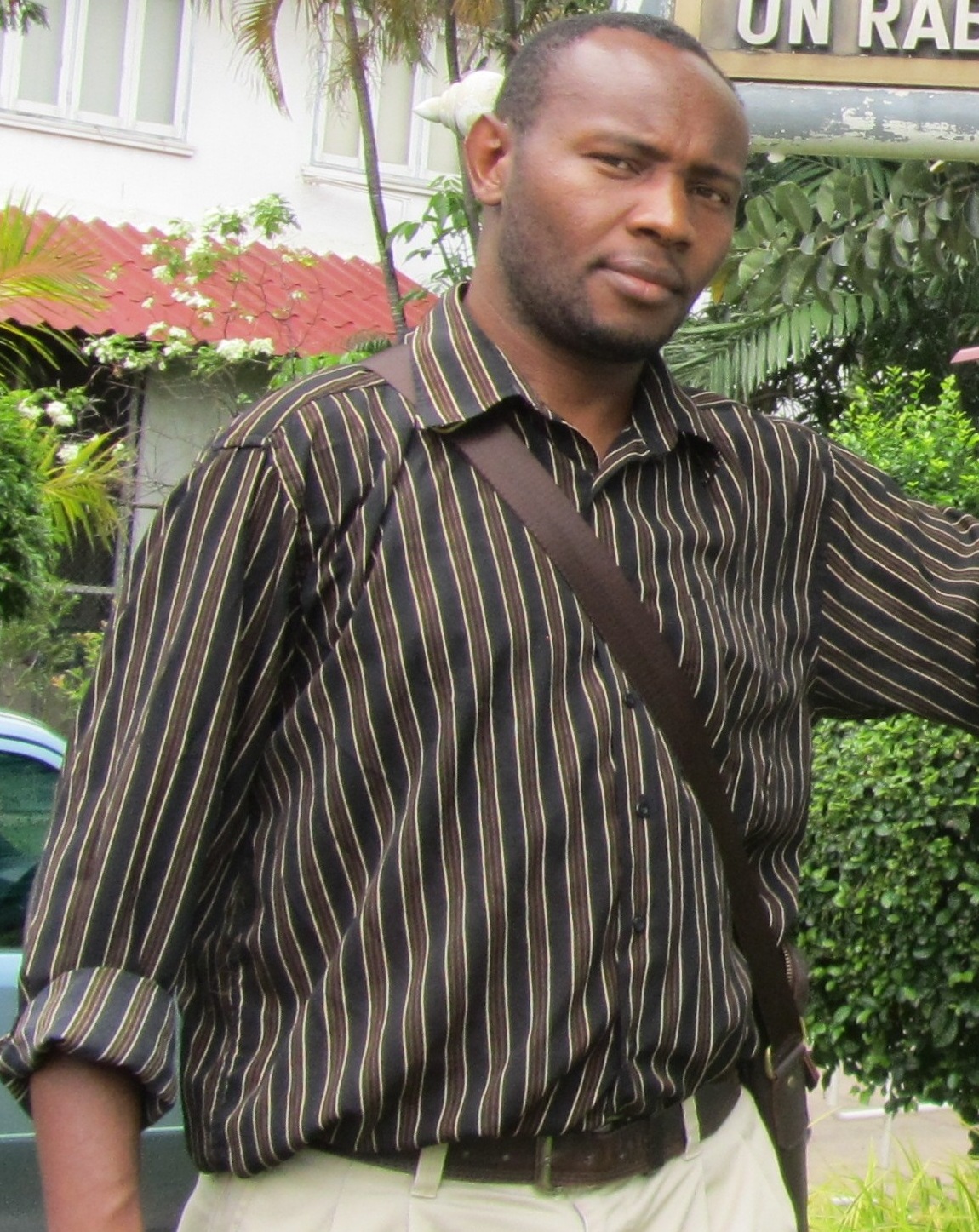 |
|
| Jesse Njihia Gitaka |
| Home
Country: |
Kenya |
| Degree: |
University of Nairobi, PhD student
Masters in Tropical Medicine from Nagasaki University, Japan
An alumnus of the University of Nairobi Medical School
|
Supervisor:
Project Title:
|
Prof. Walter Jaoko, Prof. Matilu Mwau
Surveillance for artemether-lumefantrine clinical response, lumefantrine in vitro sensitivity and molecular markers of tolerance in currently circulating Plasmodium falciparum isolates in Kenya
|
|
|
|
|
|
|
Description
of the Project: Malaria continues to be a major public health burden with about 3 billion people at risk worldwide, 28 million of them in Kenya. Following the introduction of artemisinin combination therapy (ACT) in the malaria control armamentarium, declining rates have been reported in many areas. The recent emergence of artemisinin resistant P. falciparum malaria in South East Asia therefore is a big threat towards realising elimination and eventual eradication. Strategies to protect artemisinins from parasite resistance include use of effective combination partner drugs that have longer half lifes to ensure complete parasite clearance and safeguard against selection for tolerant clones.
This study aims to evaluate the current circulating P. falciparum isolates in Kenya for Artemether/Lumefantrine therapeutic efficacy, in vitro sensitivity to lumefantrine, correlate these with established molecular markers of lumefantrine tolerance and provide baseline data for future reference. |
 |
|
| Kathleen Glover |
| Home
Country: |
Ghana |
| Degree: |
University of Manitoba. PhD student, 3rd year
MPhil Microbiology- University of Ghana
B.Sc. Medical laboratory Sciences- University of Ghana
|
Supervisor:
Project Title:
|
Dr. Kevin Coombs
Comparative study of host cell proteomic changes after Zika virus infection
|
|
|
|
|
|
|
Description
of the Project: On Feb 1, 2016, the World Health Organization declared Zika virus a public health threat because it was spreading rapidly in the Americas and was suspected to be causing a high incidence of birth defects in infants born by infected mothers. Gaining more understanding of the host proteins that are essential during Zika virus replication will reveal potential cellular targets that will be useful in development of vaccines as well as rapid diagnostic kit. Thus, the focus of my study is to identify host proteins that are significantly dysregulated during Zika virus infection and determine their role during its replicative cycle. |
 |
|
| Sandra Milena Gonzalez Diaz |
| Home
Country: |
Medellín, Antioquia, Colombia |
| Degree: |
Universidad de Antioquia, doctoral student
Microbiologist, Universidad de Antioquia, 2010
Master in Basic and Biomedical Sciences, Universidad de Antioquia, 2015 |
Supervisor:
Project Title:
|
Dr. Maria Teresa Rugeles López
Role of Vitamin D in natural resistance to HIV-1 infection: effects on viral transmission during HIV-1 exposure
|
|
|
|
|
|
|
Description
of the Project: Immunomodulatory molecules such as vitamin D could modulate the immune response triggered at mucosal level during the exposure to the HIV-1 reducing the viral transmission. In this regard, we propose to evaluate the functional effect of the VitD in an in vitro model of HIV-1 exposure contributing to understand the resistance phenomenon. |
 |
|
| Juliana Gonzalez Obando |
| Home
Country: |
Medellín, Antioquia, Colombia |
| Degree: |
Universidad de Antioquia, PhD student - Microbiology, 2nd year
Master in Epidemiology, Universidad de Antioquia (2016)
Veterinary Doctor, Universidad de Antioquia (2010) |
Supervisor:
Project Title:
|
Dr. Julian Ruiz Saenz
Epidemiological and phylogenetic characterization of the equine influenza virus in Colombia.
|
|
|
|
|
|
|
Description
of the Project: Evaluate epidemiologically and molecularly the circulation of the Equine Influenza Virus in different regions of the country, this is a zoonotic disease. During 2018, one of the largest equine influenza epidemics that the country has reported in recent years has been occurring, even in the vaccinated population The objective of this research is to epidemiologically and molecularly evaluate the circulation of the Equine Influenza Virus in different regions of the country. |
 |
|
| Colin Graydon |
| Home
Country: |
Born in Milton (Ontario), Canada |
| Degree: |
U of Manitoba, PhD candidate
BSc Microbiology and Immunology at UBC (British Columbia) |
Supervisor:
Project Title:
|
Dr. Keith Fowke
Assessment of the LAG-3 Inhibitory Mechanism on T cell Activation
|
|
|
|
|
|
|
Description
of the Project: HIV infection, like many other persistent infections, causes chronic immune activation, which can lead to a type of immune dysfunction known as functional exhaustion. Exhaustion is characterized by the impaired function of T cells, which are vital immune cells for infection control, and T cell expression of exhaustion markers, which contribute to the functional impairment of these cells. LAG-3 is one such exhaustion marker, but the mechanism it uses to impair T cell function is currently unknown. The aim of my project is to shed light this mechanism, including determining whether LAG-3 interferes with the internal signaling of the cell and/or with the cell’s ability to recognize the infection properly. This information would be crucial to understanding the effects and implications of LAG-3 in HIV and other diseases with chronic immune activation. |
 |
| Chris
Green |
| Home
Country: |
Canada |
| Degree: |
B.A
Sociology--University of Winnipeg |
Supervisor:
Project Title:
|
Dr.
Robert Hoppa
My primary PhD research is originally focusing on the modeling
of the diabetes epidemic through time and space in Manitoba.
I am currently enrolled in the interdisciplinary PhD program
at the University of Manitoba.
|
|
|
|
Description
of the Project: Over the ICID Training course, however, I will be undertaking a number of research projects in a variety of infectious disease areas including enteric infections (Salmonella, E-Coli 157, Campylobacter), and mosquito borne infections (West Nile Virus). These will occur through my ICID practicum at Cadham provincial laboratory as well as through my work as a part-time surveillance epidemiologist in the Public Health Branch, Manitoba Health.
|
 |
| Deepesh Gupta |
| Home
Country: |
India |
| Degree: |
Birla Institute of Technology and science(BITS), India
Doctoral student
Post-Graduation Diploma in Training & Development (PGDT&D)
M.Phil in Health System Management (HSM)
Masters in Health Administration (MHA) |
Supervisor:
Project Title:
|
Dr. Sushanta K Banerjee, Ipas India
Unintended pregnancies and risk of unsafe abortion: Men’s Perspective & involvement – A study among married males of Uttar Pradesh
|
|
|
|
Description
of the Project: Men in India play an important role in most decisions pertaining to family life, including family size and family planning. Strong son preference, lack of inter spouse communication related to reproductive and sexual health matters, decision to use contraceptive by men, low mobility of women are the few determinants that leads to unplanned and unwanted pregnancies which often results into unsafe abortion.
The proposed research is to understand the perceptions of men to induced abortion and contraceptive use within marriage. It will also determine the risk perception of unwanted pregnancy & unsafe abortion among married males in Uttar Pradesh, India.
|
 |
| Breanne Head |
| Home
Country: |
Winnipeg, MB, Canada |
| Degree: |
U of Manitoba, Doctoral Student 3rd year
BSc(hons) in Microbiology, University of Manitoba
Master’s degree in Medical Microbiology, University of Manitoba
|
Supervisor:
Project Title:
|
Dr. Yoav Keynan
Legionella pneumonia in HIV-infected individuals: Understanding lung inflammation, lung dysfunction and disease
|
|
|
|
Description
of the Project: Pneumonia remains the most common cause of hospital admissions each year among HIV-infected individuals with bacterial pneumonia cited as the most frequent lung infection associated with HIV. Typically, HIV-associated bacterial pneumonias are due to Streptococcus pneumoniae, Haemophilus influenza, Staphylococcus aureus or Mycobacterium tuberculosis. However, in many cases, the infectious culprit is not identified and patients are treated empirically. As such, alternative pneumonia-causing agents, such as Legionella spp., are estimated to be underreported and consequently have been understudied. Thus, this study aims to better understand Legionella pneumonia and how it contributes to lung inflammation, lung dysfunction and disease, with the goal of translating this knowledge to targeted therapy and improved outcomes for people living with HIV co-infections.
|
 |
| Mariana Herrera Díaz |
| Home
Country: |
Planeta Rica, Córdoba, Colombia |
| Degree: |
Universidad de Antioquia, doctoral student in Epidemiology, third year
Microbiologist, Universidad de Antioquia, Colombia, 2008
Master in Basic and Biomedical Sciences, Universidad de Antioquia, Colombia, 2014
|
Supervisor:
Project Title:
|
Dr. Zulma Rueda
Cytokines / Chemokines and pro-inflammatory gene expression profiles associated with Latent Tuberculosis Infection in prisoners
|
|
|
|
Description
of the Project: Diagnostic tests for Latent Tuberculosis Infection (tuberculin and IGRAs) present difficulties, so new immune substances are screened. In this regard, we propose to determine the plasma cytokines / chemokines profile and pro-inflammatory gene expression of prisoners associated with LTBI and compare it with people with active TB, and people exposed to M. tuberculosis without infection. Detecting differences in the expression of recent converters in the tuberculin test could help to discover an immune signal used as a potential diagnostic biomarker, a protective factor or an indicator of progression to M. tuberculosis infection.
|
 |
| Shehzad
Iqbal |
| Home
Country: |
Canada |
| Degree: |
BSc
--University of Calgary
MSc--University of Calgary |
Supervisor:
Project Title:
|
Dr.
Frank Plummer
Professor, Medical Microbiology, University of Manitoba
Mucosal immunity in HIV Resistant sex workers
|
|
|
|
Description
of the Project: In sub-Saharan Africa, the major route of transmission of HIV occurs
through heterosexual contact. Understanding the immune system of the
female genital tract where the initial site of infection occurs is
essential for the development of successful therapeutic interventions.
The goal of my project is to identify and characterize potential
mechanisms of immunity to HIV found at the mucosal level in HIV
resistant sex workers from the Pumwani cohort. In doing so, we hope to
artificailly induce these same responses as a potential vaccine design.
|
| |
 |
| HeZhao Ji |
| Home
Country: |
China |
| Degree: |
MD--ZhangJiaKou
Medical College
MSc Immunology--HeBei Medical University |
Supervisor:
Project Title:
|
Dr. Frank Plummer
Professor, Medical Microbiology, University of
Manitoba
Association of Interferon Regulatory factor-1 polymorphism with Resistance to HIV-1 Infection in Kenyan Female Sex Workers
|
|
|
|
Description of the Project:Originally identified as a transcription activator of IFN-beta, Interferon Regulatory Factor 1 (IRF-1) has now been shown to be a critical factor in both innate and adaptive immunity against viral infection. It was also shown to be able to initiate and promote HIV-1 transcription by interacting with HIV-1 3' LTR directly. Here, we hypothesize that IRF-1 is a critical factor in mediating resistance to HIV-1 infection, and the IRF-1 gene variations are directly responsible. To demonstrate this, comparative genetic sequencing will be conducted for the screening of IRF-1 gene polymorphisms in the target population. The association between IRF-1 gene variation and HIV-1 resistance will be determined and the underlying biological mechanisms that may contribute to this association will be explored.
|
| |
 |
| Meshack Juma |
| Home
Country: |
Homa Bay County of Kenya |
| Degree: |
University of Nairobi, Doctoral student
Bsc. Medical Microbiology from JomoKenyatta University and Msc. Medical Microbiology from University of Nairobi (UoN) |
Supervisor:
Project Title:
|
Professor Omu Anzala
Antimicroial susceptibility testing and molecular characterization of Neisseria gonorrheae isolates from patients with genital discharge in Nairobi, Kenya
|
|
|
|
Description of the Project: The emergence of multidrug resistant gonococcal infection is one of the most important public health problems today. Gonococcal infections have serious effects on reproductive, maternal and neonatal health. Effective antimicrobial therapy forms an essential component in the management of gonococcal infection. However, over recent years, the gonococcus has rapidly acquired resistance to commonly used antibiotics and very few treatment options remain; hence, regular monitoring of antimicrobial resistance is very important.
In many East Africa settings syndromic treatment of N. gonorrhoeae has been used in disease management, this raising great concern for the antimicrobial pattern of the bacteria is not properly documented.
This study will make contributions to the global goals and address Antimicrobial resistance, which is a threat to the treatment of gonorrhea.
|
| |
 |
| Jennifer Juno |
| Home
Country: |
Canada |
| Degree: |
U of Manitoba, PhD
|
Supervisor:
Project Title:
|
Dr. Keith Fowke
The Role of Genetic Polymorphisms at the CD4 locus in HIV disease progression |
|
|
|
Description of the Project: I am studying how polymorphisms in genes surrounding CD4 can impact HIV progression. A SNP in a signaling gene has been associated with delayed disease progression in a Kenyan cohort, and I am interested in the mechanism by which this SNP affects the immune response to HIV. I am also interested in the linkage between this SNP and transcription of other immune-related genes at the CD4 locus, and the impact it might have on the adaptive immune response to HIV. |
| |
 |
| Glory Kalobo |
| Home
Country: |
DR Congo |
| Degree: |
Master of Science in Tropical and Infectious Diseases year 2, University of Nairobi, Department of Medical Microbiology and Immunology
Bachelor of Medicine, University of Kisangani
|
Supervisor:
Project Title:
|
Prof Julius O Oyugi
Clinical outcomes of treatment strategies used in the management of COVID-19 patients in Kenya: Potentially effective therapy options |
|
|
|
Description of the Project: When COVID-19 hit, various treatment protocols have been proposed but with no conclusive cure so far. Patient management at the moment relies on providing supportive care on one hand and a combination of various repurposed drugs on the other hand. Studies have assessed the clinical outcomes of treatment regimens however in Africa in general and in Kenya in particular no such study covering this pivotal aspect has been conducted. The aim of my study is to assess the different strategies used to tackle this novel infection, To document the clinical outcomes, adherence to the standard of care, and the influence of co-morbidities on the clinical outcomes of the treatment strategies used in the management of COVID-19 since the first case was reported in Kenya. |
| |
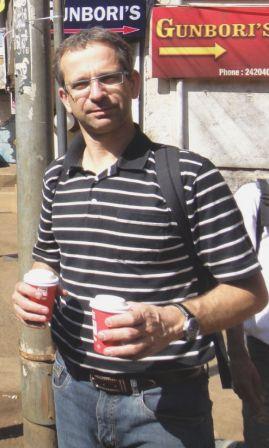 |
| Yoav Keynan |
| Home
Country: |
Canada |
| Degree: |
MD, Ben-Gurion, Faculty of Health Sciences (1995)
Specialty, Internal Medicine, Carmel Medical Center- Haifa, Israel, 2004
Sub-specialty, Infectious Diseases, University of Manitoba 2007-2009
PhD Student,
Infectious Diseases consultant, Dept. Internal Medicine, Section of Infectious Diseases
Infectious Diseases consultant, Manitoba HIV program
|
Supervisor:
Project Title:
|
Dr. Keith Fowke
Immunogenetic factors associated with Influenza cross-protection and disease severity |
|
|
|
Description of the Project: Influenza causes significant morbidity and mortality. Understanding the antibody and cell mediated cross-reactive responses to circulating strains of the virus and to influenza vaccines are the main goals of the research. In addition, immunogenetic factors that influence the severity and outcome of infection are being studied in several cohorts of immunocompetent and immunocompromised hosts. |
| |
 |
| Yusuf Adam Khalil |
| Home
Country: |
Nairobi, Kenya |
| Degree: |
University of Nairobi, Doctoral student
MBBS 2006 (International University of Africa, Khartoum, Sudan)
MMED OBSGYN 2022 (University of Nairobi, Nairobi, Kenya)
|
Supervisor:
Project Title:
|
Prof Moses Madadi Obimbo
Quantification of maternal plasma and urinary placental exosomes in fetal growth restriction. A longitudinal Study |
|
|
|
Description of the Project: Placental exosomes provide potential biomarkers used for diagnosis, prognosis and prediction of adverse pregnancy outcomes. Antenatal diagnosis allows for timely interventions to reduce morbidity and mortality. Fetal growth restriction (FGR) causes morbidity and mortality. We aim to identify the changes in placental exosome cargo in FGR and analyze the potential of these biomarkers to be used for diagnosis, prognosis and prediction of FGR. |
| |
 |
| Belindah Kibii |
| Home
Country: |
Nairobi, Kenya |
| Degree: |
University of Manitoba, Ph.D. student
MSc microbiology Wuhan institute of Virology CAS
BSc Microbiology Jomo Kenyatta University of Agriculture and Technology
|
Supervisor:
Project Title:
|
Dr. Lyle McKinnon
Evaluating mucosal immune correlates of Human Papilloma Virus (HPV) infection, clearance and persistence among sexually active women (sex workers) in Nairobi. |
|
|
|
Description of the Project: HPV is a sufficient and necessary cause a cervical cancer, which is a major cause of mortality for women globally. Meta-analyses suggest HPV prevalence is two-fold higher in sub-Saharan Africa when compared to other regions. Despite the availability of prophylactic vaccine in Kenya barriers to accessing this vaccine have led to low coverage and no uptake at all among the key population. This calls for a better treatment for HPV-related cancerous and pre-cancerous lesions. One approach is therapeutic vaccination as a point of care intervention. The aim of the study is to evaluate the mucosal immune t cell correlates of HPV infection, clearance and persistence among the sexually active women in Nairobi, Kenya. |
| |
 |
| Nathan G Kiboi |
| Home
Country: |
Nairobi, Kenya |
| Degree: |
Masinde Muliro University of Science and Technology (MMUST) Kakamega, Kenya; 3rd Year PhD Student (Clinical Chemistry)
M.Sc. Medical Biochemistry, Kenyatta University (KU), Nairobi, Kenya
B.Sc. Medical Laboratory Sciences (BMLS); Institute of Tropical Medicine and Infectious Diseases (ITROMID), Jomo Kenyatta University of Agriculture and Technology (JKUAT), Juja, Kenya
|
Supervisor:
Project Title:
|
Dr. Mathew Piero Ngugi and Meshak Juma
Molecular characterization, Phytochemical Profiling, In-vitro Antiproliferative and Anti-oxidant activities of fungal extracts from Lake Magadi, Kenya |
|
|
|
Description of the Project: At present, cancer constitutes a considerable economic and societal burden for both developing and developed nations. It accounts for most fatalities especially in the low and middle-income earning countries. In particular, cervical, breast and prostate cancer are frequently diagnosed and leading causes of cancer mortality in Kenya. Conventional anti-tumor therapeutic modalities are costly, complex and linked to high toxicity with multiple undesired adverse drug effects. Consequently, need exists to prospect alternative natural sources of anti-cancer therapy that are affordable, readily available and safe for use with fewer side effects. The saline environment harbours a repertoire of fungal diversity producing natural products with an array of bioactivities that demonstrate use as potential pharmacological agents. However, to date, still remains under-represented especially in the search for prospective novel biocompounds of natural origin. As such, my study purposes to determine molecular diveristy, phytochemical profiles, invitro antiproliferative and anti-oxidant activities of fungal extracts from lake Magadi, Kenya. |
| |
 |
| Marion Wangui Kiguoya |
| Home
Country: |
Kenya |
| Degree: |
University of Nairobi Institute of Tropical and Infectious Diseases, Ph.D. student in Infectious Diseases
|
Supervisor:
Project Title:
|
Blake Ball, Prof Thumbi Ndungu, Dr Joshua Kimani
A study to correlate longterm non progresors HIV-1 isolate viral fitness in highly exposed persistently seronegative (heps) versus low risk negatives individuals and its association with HLA subtypes. |
|
|
|
Description of the Project: In Majengo, commercial sex worker cohort Nairobi susceptibility to HIV-1 has been demonstrated, where some of the highly exposed subjects remain persistently seronegative, indicative of resistance to HIV -1. Understanding the specific immune responses conferring protection from infection in individuals exposed to HIV-1 is critical for vaccine design. This study intends to evaluate the protective immunity of the HEPS in light of viral fitness and its correlation to HLA alleles. The study will entail isolation of HIV -1 virus from the LTNP and transinfect PBMCs isolated from the HEPS and low risk individuals who are HIV negative assessing the ability to the virus to yield progeny by measuring the P24 antigen using ELISA. The study will further determine mutations and correlate with the specific HLA alleles associated with viral fitness by real time PCR. |
| |
 |
| Diana Marcela Marín Pineda |
| Home
Country: |
Medellín, Colombia |
| Degree: |
Universidad Pontificia Bolivariana, doctoral student in Biomedical Sciences, emphasis in Epidemiology
Master’s degree in epidemiology, Universidad de Antioquia, Medellín, Colombia, 2011
Bachelor’s degree. Statistician, Universidad del Valle, Cali, Colombia 2006
|
Supervisor:
Project Title:
|
Dr. Zulma Rueda
Effect of short and long term exposure to air pollution on acute respiratory symptoms, genotoxic and mutagenic damages in children under 5 years |
|
|
|
Description of the Project: Increased air pollution levels have adverse short and long-term effects on health, especially in children. In Colombia, 19,397 annual deaths in 2016 were attributed to air pollution and the additional healthcare cost was estimated at USD900,000. My study aims at investigating the effects of outdoor air pollution on heath in children under 5 year-olds. The one-year follow-up will concentrate on measuring cell damage, health outcome and hospitalization rates. The study will combine environmental and basic sciences with clinical and epidemiological information to provide a scientific base for future health-oriented environmental pollution control programmes. |
| |
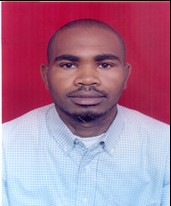 |
| Alvin Kinji Mwabu |
| Home
Country: |
Meru County, Kenya |
| Degree: |
University of Nairobi, doctoral student 3 years
Msc Medical Microbiology, ITROMID-Kemri campus, Jomo Kenyatta University of Agriculture and Technology (JKUAT)
Bsc Medical Laboratory Sciences (Bsc MLS), Institute of tropical and Infectious Diseases (ITROMID), Jomo Kenyatta University of Agriculture and Technology (JKUAT)
|
Supervisor:
Project Title:
|
Prof. Walter Jaoko, Dr. Ndemi John Kiiru, Dr. Christine Bii
Drug resistance and molecular characterization of Staphylococci species: An investigation of causes of cough in Ex—TB and smear negative patients in high TB prevalence counties: the case of Kenya. |
|
|
|
Description of the Project: Pulmonary and respiratory diseases are highly prevalent globally. They are the fourth leading cause of morbidity and mortality in humans. Majority of these diseases are of viral etiology but co-infection with secondary bacterial pathogens is on the rise. Staphylococcus species constitute a large family of respiratory tract normal flora. Colonization of this anatomical site is a prerequisite for subsequent acute Staphylococcal respiratory diseases. Moreover, Staphylococcal MDR including CA-MRSA and HA-MRSA is of profound clinical significance. Staphylococcal respiratory diseases coupled with MDR is a serious threat to global health and the fight against respiratory diseases. In this study, I envisage to explore the role of Staph. Species in Ex-TB cases, determine their Antimicrobial susceptibility, examine the resistance genetic relatedness and determine the level/degree of vancomycin resistance as the best alternative regimen for Staphylococcal Multi Drug Resistance |
| |
 |
| Sandra Koesters |
| Home
Country: |
Canada |
| Degree: |
PhD - University of Manitoba
BSc--University
of Manitoba
|
Supervisor:
Project Title:
|
Dr. Keith R. Fowke
The role of immune activation in HIV disease progression |
|
|
|
Description of the Project: My project focuses on the mechanisms of rapid disease progression in HIV. I am primarily interested in immune activation and the impact it has on apoptosis (activation induced cell death), T-cell memory homeostasis, and HIV specific T-cell memory responses. I examine these areas at the population level using two cohort with varying rates of HIV disease progression. |
| |
 |
| Monika Marie Kowatsch |
| Home
Country: |
Winnipeg, Canada |
| Degree: |
University of Manitoba, Department of Medical Microbiology and Infectious Diseases, doctoral candidate
Bachelor of Science from the University of Manitoba in the Department of Microbiology with minors in Biology, Chemistry and German.
|
Supervisor:
Project Title:
|
Dr. Keith R. Fowke
The effect of immune status on HIV risk and disease progression: immune quiescence and immune activation the teetertotter effect of the immune response and HIV |
|
|
|
Description of the Project: Despite advances in treatment and prevention options HIV infection rates remain high with 1.8 million new infections occurring yearly. Immune activation, or inflammation, is a known risk factor for HIV, conversely, decreased baseline inflammation or Immune Quiescence (IQ) has been associated with decreased risk of HIV seroconversion. My research project will focus on both sides of the inflammation vs immune quiescence question; (1) in collaboration with Sunshine House (a community-based organization in Winnipeg Manitoba) we will determine the effect of long-term solvent use on inflammation and HIV risk, and (2) with our community partners in Nairobi Kenya we will assess the ability of anti-inflammatory drugs such as Aspirin to induce an immune quiescence state and potentially protect from HIV infection. These findings will help determine the role of solvent use in HIV risk and assess the feasibility of implementations of preventing inflammation to prevent infection. |
| |
 |
| Maureen Kugo Chepchirchir |
| Home
Country: |
Eldoret, Kenya |
| Degree: |
University of Nairobi, Doctoral student
MSc. Biotechnolology, University of Nairobi
BSc. Biochemistry, University of Nairobi
|
Supervisor:
Project Title:
|
Prof. Elijah Maritim
A Novel Nutritional Approach to National School-based Deworming Programmes |
|
|
|
Description of the Project: Soil transmitted helminthes (STHs) and schistosomiasis are among the world's neglected tropical diseases. Morbidity due to these parasites is greatest in school-age children who typically have the highest burden of infection. In 2001, WHO passed a resolution for the use of large-scale mass drug administration (MDA) to deworm vulnerable children through school based programs. Though effective, there is concern that MDA might not be sustainable over extended periods. Additionally, the current MDA strategy does not consider child malnutrition, a very common affliction in resource limited countries. The aim of this study is to develop an intervention which bundles the school deworming and feeding programs to produce an affordable and sustainable treatment alternative with a minimal chance of development of resistance. Porridge flour will be enhanced with flour of the Carica papaya seed and given to school children, the efficacy of this intervention will be compared to the conventional MDA; albendazole and preziquantel. |
| |
 |
| Toby Le |
| Home
Country: |
Guelph, Ontario |
| Degree: |
University of Manitoba, Medical Microbiology and Infectious Diseases, Year 3
Bachelor of Medical Science (BMSc), Honours Specialization in Microbiology and Immunology, Western University of Ontario
|
Supervisor:
Project Title:
|
Dr. Keith Fowke
Effects of DMPA on peripheral blood natural killer cells in sex workers from Nairobi, Kenya |
|
|
|
Description of the Project: Depot medroxyprogesterone acetate (DMPA) is an affordable hormonal contraceptive that is administered every three months and is the most utilized form of hormonal contraceptive in Sub-Saharan Africa. Unfortunately, the use of DMPA has been linked with increased risk for HIV acquisition. My research focuses on a specific immune cell called Natural Killer cells - a type of lymphocyte that protects against tumour cells and viral infections. Depending on their activation and function, Natural Killer cells have been shown to help prevent HIV infections. By using blood samples collected from the Kenya sex worker cohort, the goal is to compare and assess how DMPA affects the activation and function of blood Natural killer cells. |
| |
 |
| Leidy Damariz Marín Palma |
| Home
Country: |
Medellín, Antioquia, Colombia |
| Degree: |
Universidad de Antioquia, PhD student of Biology 3rd year
Master’s degree in Basic Biomedical Science, Medicine Faculty, Universidad de Antioquia (2017)
Bachelor’s degree as Biologist, Universidad de Antioquia (2014)
|
Supervisor:
Project Title:
|
Dr Juan Carlos Hernández and Dr María Teresa Rugeles
Effect of particulate matter in the air on the inflammatory response and susceptibility to infection by the Respiratory Syncytial Virus and SARS-COV2. |
|
|
|
Description of the Project: An association between exposure to PM and diseases of the respiratory system, including lung cancer, asthma, and chronic obstructive pulmonary disease (COPD), as well as increased susceptibility to respiratory viral infections, has been documented. In the pathogenesis of these various diseases and / or infections, the inflammatory process plays a very important role; however, the mechanisms involved in PM-induced inflammation are not yet clearly defined. The objective set for this study is to evaluate the effect of PM2.5 and PM10 present in the air of the metropolitan area of Valle de Aburrá-Colombia on cellular cytotoxicity, the inflammatory response and susceptibility to infection by viruses such as RSV and SARS-COV-2. |
| |
 |
| Zipporah Machuki |
| Home
Country: |
Kenya |
| Degree: |
U of Manitoba Doctoral Student
|
Supervisor:
Project Title:
|
Dr. Terry Blake Ball
Differentiating Toll-Like Receptor (TLR) 7 and TLR8 responses in lymphocyte population contained in peripheral blood mononuclear cells and their effect on HIV replication invitro |
|
|
|
Description of the Project: In 2014 about 36.9 million people were living with HIV/AIDS worldwide and there were approximately 2.0 million new HIV infections. The design of a vaccine that can prevent HIV infection remains a global priority. Susceptibility to HIV has been shown to depend on the inflammation level and availability of target cells mainly CD4+ T cells that express CCR5 and a4ß7 genital mucosa while in human peripheral blood, CD4+ T cells expressing CCR6+ are most permissive to HIV infection. However, the mechanism leading to immune activation in HIV infections remain poorly understood. This study aims to assess the effect of toll like receptor 7 and 8 stimulation of innate T lymphocytes, on immune activation and HIV infection of peripheral blood mononuclear cells (PBMCs). |
| |
 |
| Oliver Waithaka Mbuthia |
| Home
Country: |
Nairobi, Kenya |
| Degree: |
University of Nairobi, PhD
MPH., Epidemiology, Mount Kenya University
M.Sc., Infectious Diseases, Kenyatta University
B.Sc., Medical Laboratory Science, Kenyatta University
|
Supervisor:
Project Title:
|
Prof. Julius Oyugi
Helicobacter pylori virulence genes, bacterial gene mutation to antibiotics and gut microbiota correlates for early detection of gastric cancer. |
|
|
|
Description of the Project: Helicobacter pylori (H. pylori), a group 1 carcinogen agent, is the strongest risk factor in over 70% of gastric cancer cases and accounts for 7.5% of all cancers worldwide. Human gut is rich with microbiota that is correlated to health and disease, but the interplay of microbes, host and disease is needed to decipher management of gastric diseases. Understanding H. pylori genetic predisposition and the diversity of gut microbiota are key targets in the development and formulation of adoptable diagnostic, therapeutic and preventive tools. Laboratory tests used during routine H. pylori diagnosis to confirm the infection have limited use in giving conclusive decision to initiate therapy in the context of high H. pylori prevalence. The need for noninvasive region-specific, highly sensitive and specific detection tools that can early diagnose gastric cancer and initiate appropriate treatment is critical. This study, therefore, aims to determine correlates of gastric disease occurrence, its progression and/or prognosis and evaluate the efficacy of different stool processing techniques to early diagnosis H. pylori-associated gastric adenocarcinoma. |
| |
 |
| Jehidys Montiel Ramos |
| Home
Country: |
Colombia |
| Degree: |
University of Antioquia, PhD student -Epidemiology
MSc. Biomedical Basics Sciences, University of Antioquia, Medellin, Colombia
B.A. Microbiologist, School of Microbiology, University of Antioquia, Medellin, Colombia
|
Supervisor:
Project Title:
|
Dr. Alberto Tobón Castaño
Prevalence and risk factors of asymptomatic Plasmodium spp. infections in two different endemic malaria regions in Antioquia, (Colombia), 2017 |
|
|
|
Description of the Project: Malaria is a global public health problem. One of the main challenges for successful control programs is the detection of asymptomatic infections, which represent silent reservoirs of the parasite. For the other hand, these kind infections increase the risk of developing chronic anemia and have been associated with increased inflammation and chronic endothelial activation, whose long-term consequences are unknown. Given the importance of asymptomatic infections in maintaining transmission of the parasite, potential adverse effects on carriers, the lack of knowledge about the epidemiology, individual factors, and socioeconomic context associated with asymptomatic infections in Colombia and particularly in the department of Antioquia, the findings of this study provide useful information for the design and implementation of control measures according to the profiles of each endemic area. |
| |
 |
| Sajid Mahmood |
| Home
Country: |
Pakistan and Canada |
| Degree: |
University of Manitoba, PhD
Doctor of Veterinary Medicine, Pakistan
MS- Kansas State University, USA
|
Supervisor:
Project Title:
|
Dr. Sam Kung
Examining NK – DC Crosstalk in NK differentiation and functional properties of NK cells |
|
|
|
Description of the Project: Therapeutic potential of NK-DC crosstalk in the management and control of infectious diseases has been an evolving concept in the field of biology. My project will formally and systematically examine whether DCs are involved in NK progenitor differentiation. Understanding DCs role in NK differentiation, particularly in peripheral tissues might provide new insights into NK biology and help us device better therapeutic approaches against infectious agents homing these tissues. |
| |
 |
| Akumu Reveszt Maugo |
| Home
Country: |
Kenya |
| Degree: |
PhD, University of Nairobi
Msc degree in Molecular Pharmacology
Bachelors degree in pharmaceutical science Maseno University
|
Supervisor:
Project Title:
|
Professor Julius O Oyugi
Development, Evaluation, and Validation Of a Novel SARS–Cov-2 Reverse Transcription Loop-Mediated Isothermal Amplification Assay |
|
|
|
Description of the Project: Severe Acute Respiratory Syndrome Corona Virus 2 (SARS-COV2) causes Corona Virus Disease. COVID-19 is a global health pandemic and is especially a major hazard to persons who are immunocompromised, elderly, or have pre-existing medical conditions. To implement effective diagnostic processes and prevent disease spread, it is necessary to employ efficient diagnostic tools such as loop mediated isothermal amplification assays, which, unlike qRT-PCR, are more robust in terms of turn around times, ease of use and affordability. |
| |
 |
| Leigh McClarty |
| Home
Country: |
Canada |
| Degree: |
University of Manitoba, Doctoral student
BSc (Hons) in Microbiology & Zoology from the University of Manitoba
MSc in Community Health Sciences from the University of Manitoba
|
Supervisor:
Project Title:
|
Dr. James Blanchard; Co-supervisor: Dr. Marissa Becker
Understanding healthcare priorities of young women involved in sex work in Zaporizhzhya, Ukraine: Implications for preventive HIV programming |
|
|
|
Description of the Project: Recent research suggests that existing HIV prevention program models, which have been successful in providing health services to older and/or well-established female sex workers, often miss young women who are just entering into sex work. It is now necessary to tailor HIV prevention programs to better reach women at the start of their sex work careers, and a critical aspect of understanding how to link new and young sex workers into preventive HIV services will be to gain a deeper understanding of their personal healthcare priorities prior to and immediately upon entering into sex work. This study, focusing on the Ukrainian city of Zaporizhzhya, will explore young women’s self-identified healthcare priorities before and immediately following entry into sex work. Although HIV is likely a concern for women involved in sex work, it may not be a specific priority in the early stages of their sex work careers. Additionally, my research aims to determine whether HIV risk is different between women who do and do not identify HIV prevention as a personal healthcare priority. It is my hope that this study will contribute to an important, yet poorly understood area in HIV prevention, and that findings from this work can be used to inform policy and HIV prevention program design to begin to address the unique needs of new and young sex workers, globally. |
| |
 |
| Cisily Meeme |
| Home
Country: |
Kenya |
| Degree: |
University of Nairobi, Doctoral student
MSc. Medical virology - Jomo Kenyatta University of Agriculture and Technology
BSc. Microbiology - Jomo Kenyatta University of Agriculture and Technology
|
Supervisor:
Project Title:
|
Dr. Elijah M. Songok , Dr. T. Blake Ball , Prof. James Ochanda
Evaluation of Drug Resistance Profiles and Viral Characteristics in HIV-1 Viruses from Infected Patients Before and After Receiving Antiretroviral Therapy |
|
|
|
Description of the Project: The scale-up of ART has been associated with a rise in antiretroviral resistance, a major cause of treatment failure. The population involved in this study has been treated since 2005 and there is need to assess the impact of ART availability in drug resistance instances. Since studies have shown HIV-1 non-B subtypes dominate in this population determination of antiretroviral resistance profiles will be useful in development of surveillance and monitoring tools specific to the local epidemic. The specific role played by primary and/or secondary mutations will be explored because understanding drug resistance in a commercial sex worker cohort plays an important role in evaluating risk of transmission to the general population. Other factors such as the role of cell-associated and cell-free HIV-1 and variation in infectious virus population will be explored for possible influence on treatment failure. |
| |
 |
| Dessalegn Melesse |
| Home
Country: |
Born in Ethiopia |
| Degree: |
University of Manitoba, PhD candidate
M.Sc., University of Manitoba, Canada
Postgraduate Diploma, African Institute for Mathematical Sciences (host institution: University of Cape Town), South Africa
B.Ed., Bahir Dar University, Ethiopia
|
Supervisor:
Project Title:
|
James Blanchard
Understanding heterogeneity in HIV transmission dynamics among key populations at highest risk of acquisition. |
|
|
|
Description of the Project: The HIV epidemic in Pakistan is most concentrated among key populations (KPs) at highest risk of acquisition, specifically people who inject drugs (PWIDs) and sex workers (female, male and transgender). So far, most of the epidemic is concentrated in PWIDs, where the HIV prevalence has reached very high levels. There is evidence to suggest that a significant proportion of sex workers have interacted with PWIDs through sexual or drug injecting networks, thus augmenting their own risk of HIV acquisition. As a result, there is a growing concern that the Pakistan’s HIV epidemic will increase substantially among sex workers, and with increasing sexual transmission to other segments of the population through their clients and other sexual partners. My research intends to explore the complex sexual and injection networks among KPs in Pakistan to elucidate pathways leading to heterogeneity in HIV transmission epidemics. Combined with epidemiological analyses, mathematical models will be utilized to gain insight into the current and future status of the HIV epidemics, the subpopulations that drive new HIV infections, and how HIV sub-epidemics evolve over time in Pakistan. Findings from my research will be very important for gaining a more precise understanding of context-specific complexities that dictate the HIV transmission dynamics as well as for comparing potential heterogeneity between geographic regions. |
| |
 |
| Paul McLaren |
| Home
Country: |
Canada |
| Degree: |
PhD - University of Manitoba
BSc--University
of Manitoba
|
Supervisor:
Project Title:
|
Dr. Keith Fowke
Resistance to HIV-1; The Role of Immune Gene Expression |
|
|
|
Description of the Project: Heterogeneity exists in the population with respect to susceptibility to infection by HIV. Evidence exists that genetic and immune factors contribute to the development of HIV resistance in the Nairobi commercial sex-workers cohort. Using microarray technology my project involves genomic analysis of immune function of CD4+ T cells of HIV resistant women and how this differs from susceptible individuals both at baseline and when stimulated with HIV and non-HIV antigens. Determining if patterns of gene expression exist that characterize HIV resistant individuals as well as discovering factors that may mediate this resistance is the principle goal of this project and may lead to the discovery of an HIV vaccine. |
| |
 |
| Lyle McKinnon |
| Home
Country: |
Canada |
| Degree: |
PhD - University of Manitoba
BSc--University
of Winnipeg
|
Supervisor:
Project Title:
|
Dr.
Frank Plummer
HIV Env-specific CD8 T cell responses in Kenyan sex workers |
|
|
|
Description of the Project: Although HIV-specific CD8 T cells are capable of containing HIV and are the basis of several candidate HIV vaccines, it remains to be clear why they often fail as HIV-infected individuals progress to AIDS. A large, prospective sex worker cohort in Nairobi, Kenya contains several women who remain uninfected despite intense exposure and others who are HIV-positive but do not progress to AIDS. By comparing the HIV-specific CD8 T cell specificity and phenotypes between these examples of immunological success and AIDS-progressing individuals, protective responses may be identified. Knowledge of what makes an HIV-specific CD8 T cell response effective would aid evaluation of current vaccines and design of later generation vaccines. |
| |
 |
| Yitagele Terefe Mekonnen |
| Home
Country: |
Harar, Ethiopia |
| Degree: |
University of Nairobi, year I PhD student in Tropical and Infectious Disease
Master of Science in Veterinary Public Health (MVPH), Addis Ababa University, Ethiopia (2017)
Master of Science in Tropical Animal Health (MSTAH), Institute of Tropical Medicine, Antwerp, Belgium (2012)
Doctor of Veterinary Medicine (DVM) in Addis Ababa, University, Ethiopia (2007)
|
Supervisor:
Project Title:
|
Dr. Julius Oyugi, University of Nairobi, Kenya
Molecular Epidemiology and Antimicrobial Resistance of Campylobacter Species and their role in childhood malnutrition in Eastern Ethiopia |
|
|
|
Description of the Project: Campylobacter species are the major bacterial pathogens causing foodborne diarrheal illness in humans and represent the main cause of diarrheal disease mortality in children in developing countries. Currently it is considered as a predominant cause of Environmental Enteric Dysfunction (EED) in children. These lines of evidence converge to suggest that Campylobacter species are the main pathogenic bacteria causing stunting. Moreover, Campylobacter isolates have raised great concerns due to a frequent emergence of antibiotics resistance. Limited studies have been reported on Campylobacter infection in both animals and humans in developing countries including Ethiopia. Similarly, the genotypic information from developing countries is lacking. Hence this PhD study aimed to identify the role of Campylobacter species in childhood malnutrition and determine the molecular epidemiology and antimicrobial resistance profiles Campylobacter in Ethiopia. |
| |
 |
| Marylin Mora-Morales |
| Home
Country: |
San Andres island, Colombia |
| Degree: |
Antioquia University, Doctoral student in Epidemiology
Master’s degree in biomedical Basic Sciences, Antioquia University, Medellín, Colombia, 2018
Bachelor’s degree as Microbiologist, San Buenaventura University. Colombia, 2004
|
Supervisor:
Project Title:
|
Dr. Zulma V. Rueda
Epidemiological characterization, risk factors and clinical impact of mycobacterium tuberculosis infection in native patients in San Andres, Providencia and Santa Catalina islands: diagnostic and therapeutic implications.
|
|
|
|
Description of the Project: It is the objective of the present research proposal to concentrate efforts by studying the dynamics of tuberculosis infection in the root population that inhabits the archipelago of San Andrés, Providencia and Santa Catalina. This will be achieved, assessing as a whole unreported transmission mechanisms and risk factors not described in this population, in combination diagnostic tool for latent infection and risk of reactivation in susceptible individuals. |
| |
 |
| Pellen Mungai |
| Home
Country: |
Nairobi, Kenya |
| Degree: |
MSc, Medical Microbiology, University of Nairobi, Department of Medical Microbiology and Immunology
BSc, Medical Laboratory Sciences, Kenya Methodist University
|
Supervisor:
Project Title:
|
Dr. Susan A Odera
Mutation Patterns of Rifampicin Resistant Mycobacterium tuberculosis from the National Tuberculosis Reference Laboratory, Kenya
|
|
|
|
Description of the Project: Tuberculosis is the leading cause of death worldwide. Prior to COVID, it was the leading cause of death from a single infectious disease. Each year, around 10 million TB infections are expected, with roughly one-third of them being drug-resistant, including rifampicin resistance, resulting in over a million fatalities. Drug-resistant strains offer a significant obstacle in the fight to eradicate tuberculosis. This happens when a drug-sensitive patient is mishandled or discontinues treatment, causing germs to develop resistance to the medications, particularly rifampicin, which is the cornerstone of tuberculosis treatment. Rifampicin resistance is a slow but growing problem which if not checked will lead high treatment failure rates hence leading to transitioning patients to second-line treatments which costlier, lengthier with more adverse effects. This study aims to determine the disease burden resulting from rifampicin resistance after establishing the MTBC strain with a high tendency/frequency of RIF resistance. This would help in deciphering a strain specific treatment approach. |
| |
 |
| Victor Moses Musyoki |
| Home
Country: |
Nairobi, Kenya |
| Degree: |
University of Nairobi, Department of Medical Microbiology, 2nd year PhD student
MSc. Medical Microbiology, University of Nairobi
BSc. Medical Laboratory Sciences, Jomo Kenyatta University of Agriculture and Technology; BA, University of Nairobi
|
Supervisor:
Project Title:
|
Prof Omu Anzala
Whole genome shotgun sequencing and flow cytometry to explore the Diabetic Foot Microbiome and Inflammasome
|
|
|
|
Description of the Project: Diabetic foot ulcer is a global public health concern and has been associated with lower limb amputation and reduced quality of life among diabetic patients. These ulcer wounds are colonized by specific microbes or community of microbes mostly from the skin microbiome playing a role in clinical infection and delayed wound healing. Traditional culture methods used are known to have bias in characterization of microbiome present in these wounds. This study will employ a suite of molecular and chemical analysis in order to help better understanding of microbial communities, host inflammatory responses and healing outcome of the different diabetic foot ulcer presentations. |
| |
 |
| Florence Mutua |
| Home
Country: |
Kenya |
| Degree: |
University of Manitoba, Doctoral student
MSc in Medical Microbiology, University of Nairobi
Bachelor of Medicine and Bachelor of Surgery (MBChB), University of Nairobi
|
Supervisor:
Project Title:
|
Dr. Blake Ball
The effect of concurrent HIV infection on interferon signaling and transcript signatures in tuberculosis
|
|
|
|
Description of the Project: Tuberculosis is currently ranked alongside HIV as a leading cause of death by a single infectious agent. TB presents as a spectrum with latent TB at one end and active TB at the other; HIV being a potent factor in reactivation of LTBI to active TB. Interferons have multiple roles in infectious diseases including antiviral and immunomodulation roles. In Mycobacterium tuberculosis infection type II interferons play a protective role while that of type I IFNs remains incompletely understood. This study therefore aims to assess interferon signaling in TB, the effect concurrent HIV infection has on this signaling and associate these with cytokine responses to define a potential prediction factor for disease progression. |
| |
 |
| Lucy Wangari Mwangi |
| Home
Country: |
Nairobi, Kenya |
| Degree: |
University of Nairobi; PhD. Student
MSc. Tropical and Infectious Diseases, University of Nairobi Kenya
BSc. Medical Laboratory Science, Kenyatta University Kenya
|
Supervisor:
Project Title:
|
Dr. Keith Fowke and Dr. Julius Oyugi, PhD
Limiting HIV Target Cells in the Female Genital Tract by Inducing Immune Quiescence
|
|
|
|
Description of the Project: HIV/AIDS is still a big global challenge, disproportionately affecting Sub-Saharan Africa and especially women. Increased immune activation is a risk factor for HIV-1 infection; with abundant production of pro-inflammatory cytokines promoting viral replication in infected cells. We have also learnt that a higher risk of sero-conversion is associated with increased immune activation prior to HIV exposure. However, Highly Exposed Seronegative (HESN) individuals are seen to have a unique immune quiescence (IQ) phenotype and despite HIV exposure remain uninfected; they show a lower base level immune activation than other people and few HIV target cells in the female genital tract. This study aims to answer the question of whether anti-inflammatory drugs, aspirin and hydroxychloroquine, can decrease T cell immune activation among a HIV negative population thereby induce this IQ phenotype; with the goal to develop a new avenue to prevent HIV infection. |
| |
 |
| Ruth Sada Mwatelah |
| Home
Country: |
Nairobi, Kenya |
| Degree: |
PhD University of Manitoba
Msc Epidemiology, Jomo Kenyatta University of Agriculture and Technology, Kenya
Bsc Medical Microbiology, Jomo Kenyatta University of Agriculture and Technology, Kenya
|
Supervisor:
Project Title:
|
Dr. Lyle McKinnon and Dr. Keith Fowke
Impact of sex work and behavioral factors on the immunological milieu of young female sex workers in Mombasa.
|
|
|
|
Description of the Project: Commensal microbes and inflammatory cytokine/chemokines form a major part of the vaginal immune milieu, and both have been associated with HIV acquisition risk. However, the upstream drivers of vaginal dysbiosis and inflammation remain only partially defined. A large proportion of new HIV infections in Sub-Saharan Africa occur in females under 25 years of age, particular those practicing sex work, but limited data are available on HIV risk factors at the time of entry into sex work. In my study I seek to characterize the vaginal microbiome and cytokine profiles of young women aged 14-24 years from Mombasa, Kenya. |
| |
 |
| Vaishnavi Vishram Naik |
| Home
Country: |
Bangalore, India |
| Degree: |
PhD Scholar, Ramaiah University of Applied Sciences, Bengaluru, Karnataka
Masters, Medical Microbiology, Kasturba Medical College, Manipal Academy of Higher Education. Mangalore, Karnataka, India
BSc(Chemistry, Botany and Zoology), Government Arts and Science college, Karnataka University Dharwad, Karwar, Karnataka, India
|
Supervisor:
Project Title:
|
Dr. Tushar Shaw
Nasopharyngeal carriage of Streptococcus pneumoniae serotypes among children and their cohabiting relatives in South India: a cross-sectional study
|
|
|
|
Description of the Project: The study aims to determine the prevalence of nasopharyngeal carriage of Streptococcus pneumoniae serotypes among children and their cohabiting relatives in South India. The study seeks to shed significant knowledge on the prevalence and distribution of certain pneumococcal serotypes in this population and reveal potential transmission mechanisms within familial households. Through the utilization of advanced molecular techniques and meticulous sampling procedures, comprehensive data will be gathered to refine our comprehension of pneumococcal carriage dynamics in this region. Moreover, it is anticipated that the study's discoveries will guide targeted vaccination strategies and make significant contributions to the broader campaign against pneumococcal-related illnesses in South India. |
| |
 |
| Frank Ndaks Ndakala |
| Home
Country: |
Vihiga County, Kenya |
| Degree: |
University of Nairobi Institute of Tropical and Infectious Diseases (UNITID), PhD, Infectious Diseases
Postgraduate Diploma in Translational Medicine, University of Edinburgh, Scotland
Master of Science in Applied Parasitology & Immunology, University of Nairobi, Kenya
Bachelor of Science in Applied Biology, University of Nairobi, Kenya
|
Supervisor:
Project Title:
|
Prof. Francis Mulaa (University of Nairobi), Prof. Ben Estambale (University of Nairobi) and Dr. Julius Oyugi (University of Nairobi and co-supervisor Prof. Georg M. N. Behrens (University Hospital Hanover))
Molecular Genetic Analysis of Antiretroviral Therapy Related Adverse Drug Events (ADEs) in Kenya |
|
|
|
Description of the Project: During the administration of Antiretroviral Therapy (ART), Adverse Drug Events (ADEs) can contribute to treatment failure or drug resistance thus delaying the rapid delivery of much needed treatment to patients. Since ADEs are greatly influenced by polymorphisms in genes responsible for drug metabolism e.g. cytochrome p450 (CYP450), there is need to generate and avail patient’s genetic information to physicians before treatment initiation. The object of this work will be to assess the influence of genetic polymorphisms of CYP450 on ARV related ADEs among HIV patients in Kenya. Further, my study will aim at coming up with less invasive and cost effective mechanisms for predicting antiretroviral drug
related toxicities. |
| |
 |
| Dr Lilian N Njagi |
| Home
Country: |
Kenya |
| Degree: |
U of Nairobi, doctoral student
Diploma in Tropical Medicine and Hygiene (DTM&H), London School of Hygiene and Tropical Medicine (LSHTM) with Makerere University and Kilimanjaro Christian Medical School
Master of Science in Tropical and Infectious Diseases (MSc TID), University of Nairobi
Bachelor of Medicine and Bachelor of Surgery (MBChB), University of Nairobi
|
Supervisor:
Project Title:
|
Dr. Julius Oyugi, PhD
Isoniazid for latent TB infection in people living with HIV: Novel strategies for treatment monitoring. |
|
|
|
Description of the Project: Tuberculosis (TB) is still a major public health challenge of global interest. Latent TB infection (LTBI) is the greatest contributor to active TB. Achieving control of TB must therefore entail innovation in LTBI management. We aim to validate novel methods of LTBI treatment monitoring amongst PLHIV, specifically therapeutic drug monitoring of isoniazid (INH) using hair samples, and response monitoring using change in interferon gamma secretion in response to peptides encoded by genes upregulated during the LTBI phase. |
| |
 |
| Faisal Nuhu |
| Home
Country: |
Ghana |
| Degree: |
Ph.D. Student, Department of Medical Microbiology and Infectious Diseases, University of Manitoba
BSc. Biological Sciences (Honors), Kwame Nkrumah University of Science and Technology,
Ghana, 2017
|
Supervisor:
Project Title:
|
Dr. Lyle McKinnon PhD
Mechanism of cytokine associated HIV susceptibility in female genital tract:
Defining the roles of IFN-a2a and IL-2. |
|
|
|
Description of the Project: The female genital tract (FGT) is a primary site for HIV acquisition, and inflammation has been shown to increase HIV risk. Understanding immunological and molecular mechanisms at mucosal sites may therefore represent a novel HIV prevention strategy.
In contrast to many inflammatory cytokines such such as IFN-a2a that were strongly associated with HIV risk, homeostatic regulators such as IL-2 were associated with protection from HIV acquisition in South African women enrolled in CAPRISA-004.
My research seeks to entangle how a canonical antiviral molecule, type I interferon known to interfere with viral replication yet associated with HIV risk. Also, we will investigate how IL-2 regulation in the cervicovaginal environment can lead to reduced HIV susceptibility. |
| |
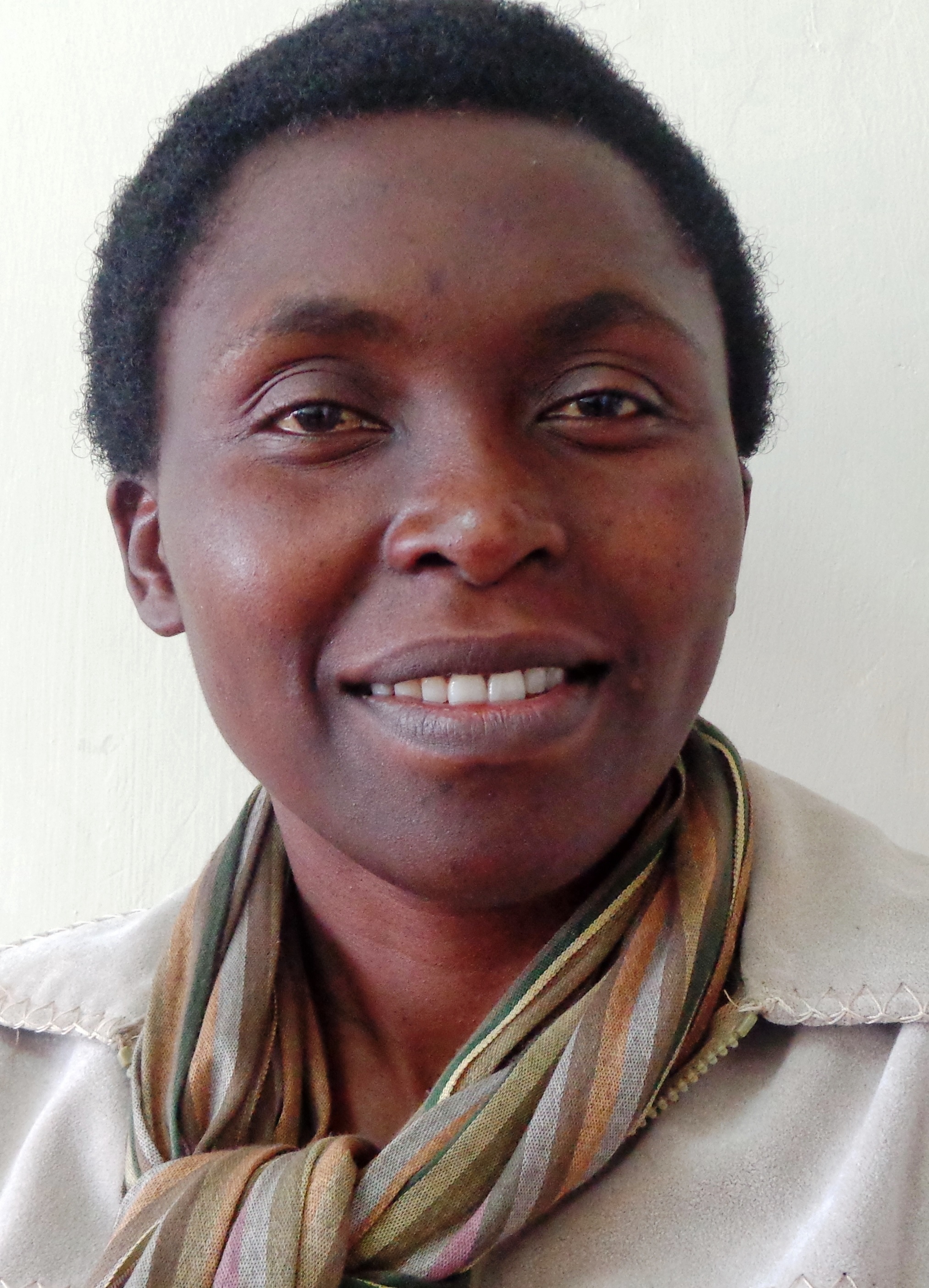 |
| Emily Nyariki |
| Home
Country: |
Kenya |
| Degree: |
PhD (University of Nairobi)
Master of Arts Degree (Population Studies) - University of Nairobi
Bachelor of Arts (Sociology and Religion) University of Nairobi
|
Supervisor:
Project Title:
|
Prof Joyce Olenja, Dr. Robert Read Lorway, DDr. Sabina Wakasiaka and Prof Omu Anzala
Volunteers’ perceptions and experiences of clinical research participation in Kenya:
Case study of KAVI volunteers |
|
|
|
Description of the Project: The conduct of clinical research faces unique challenges that compromise optimal recruitment of volunteers into studies. In KAVI, Kenya, where a number of clinical research studies are being conducted, data from recruitment sites reveal that some eligible volunteers fail to turn up for enrollment. A mixed method design will be used to explore volunteers’ perceptions and experiences and their potential impact on decision making to participate in clinical research. |
| |
 |
| Missiani Ochwoto |
| Home
Country: |
Kenya |
| Degree: |
The University of Nairobi, PhD
Bsc. Biomedical Science and Technology - Maseno University
MSc in Medical Virology- Jomo Kenyatta University of Agriculture and Technology (JKUAT)
|
Supervisor:
Project Title:
|
Dr. Elijah M. Songok , Dr. Carla Osiowy , Prof. James Ochanda
Molecular Characterization of Acute and Chronic Hepatitis B Virus among Patients Attending Selected Hospitals in Kenya. |
|
|
|
Description of the Project: Hepatitis B Virus (HBV) is the major cause of Hepatocellular Carcinoma (HCC) and liver related mortality worldwide. In this study, acute and chronic HBV patients will be followed up in three different sites in Kenya with the aim of exploring the viral factors (genotypes and virus mutations), host factors (Mutation at P53 tumor gene) and environmental factors (exposure to afflatoxins) that contribute to high HCC. The study will also compare the molecular characteristics of the viruses responsible for acute and chronic hepatitis and use the consensus nucleotide sequences obtained to develop a kit that will detect and/or predict Hepatitis B Viruses likely to develop chronic infection. The main focus will be to document the factor(s) that can be targeted for interventional measures among the infected HBV population. |
 |
| Ifeoma Benedette Okwor |
| Home
Country: |
Enugu State, Nigeria |
| Degree: |
University of Manitoba, PhD, Medical
Microbiology,
Medicine
Master of Science, Immunology, University of Manitoba
Doctor of Veterinary Medicine, ABU, Zaria, Nigeria
|
| Supervisor: |
Dr. Jude Eze Uzonna
|
Project Title:
|
Regulation of Secondary Anti-Leishmania Immunity |
|
|
|
Description
of the Project: Leishmaniasis is a global public health problem and has been identified by World Health Organization as one of the tropical diseases for intensive research. Previous data from our lab shows that LIGHT; a member of the TNF super family of cytokines play a critical role in protection against primary Leishmania infection. My project will investigate the role of LIGHT and other TNF superfamily members in secondary immunity against Leishmania parasites. |
 |
| Titus Olukitibi |
| Home
Country: |
Nigeria |
| Degree: |
University of Manitoba, PhD, Medical
Microbiology,
Medicine
Master’s Degree in Medical microbiology; Federal University of Technology Akure; 2017
Bachelor’s Degree in Microbiology; Federal University of Technology; Akure; 2012
|
| Supervisor: |
Dr. Xiao-Jian Yao
|
Project Title:
|
Development and Characterization of a Novel DC-Targeting Universal Vaccine Approach against Influenza Infection |
|
|
|
Description
of the Project: Influenza virus disease has received global attention because of its high morbidity and mortality rate and difficulty in management due to mutation and reassortment caused by antigenic drifts and shifts, respectively. The consequent constant changing in the forms of influenza virus has led to the yearly production of vaccine based on predictions; however, the predicted vaccines can be mismatched and may not be able to protect against emerging pandemic strains of influenza virus. Because of this, the Center for Disease Control (CDC) has recently declared an urgency in developing a universal vaccine that can give broad protection against all existing forms and futuristic forms of the influenza virus. In our response to this call, we have developed a dendritic cell (DC)-targeting vaccine approach using Ebola virus glycoprotein with deleted Mucin-like Domain to direct the conserved epitopes of influenza virus surface antigens which include the haemagglutinin (HA), matrix protein (M2) to DCs. Our results so far have shown that the immunization of mice with virus-like-particles (VLPs) incorporated plasmids stimulate both adaptive and humoral immune responses against influenza virus; therefore, we will further investigate the protection induced by this approach in mice using different strains of influenza virus. |
| |
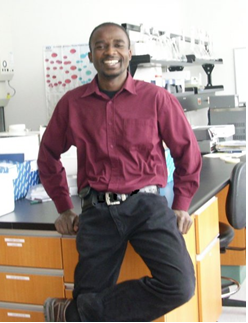 |
| Robert Were Omange |
| Home
Country: |
Kenya |
| Degree: |
PhD, University of Manitoba
Masters of Science in Molecular Medicine, Institute of Tropical
Medicine and infectious diseases
Bachelor of Science in Zoology and Chemistry, University of
Nairobi
|
Supervisor:
Project Title:
|
Dr.
Frank Plummer
Linkage of innate and adaptive immunity in HIV-1 resistant women in Nairobi |
|
|
|
Description of the Project: The innate mechanisms responsible for the development of HIV specific adaptive response in HEPS individual and chronic HIV infection are still unknown. Exposure to the HIV antigens and recognition by the innate immune system together appears to lead to the development of these responses. Understanding the linkage between the innate and adaptive immune response in HIV-1 disease is integral to elucidate the mechanism for development of HIV-1 specific responses. |
| |
 |
| Tosin Omole |
| Home
Country: |
Akure, Ondo state, Nigeria |
| Degree: |
University of Manitoba, PH.D. student, 3rd year
Bachelor of Technology (B. Tech) in Microbiology, Federal University of Technology, Akure, Nigeria
|
Supervisor:
Project Title:
|
Dr. Lyle McKinnon
Pre-HIV Circulating T Cell Profiles as Predictors of HIV Acquisition and Early Disease Progression |
|
|
|
Description of the Project: CD4+ T cells are central to the function of the immune system and play a crucial role in HIV infection. A previous report showed that specific CD4+ T phenotypes are associated with an increased risk of HIV acquisition. My project, therefore, aims to investigate the association between an individual’s immune composition and the risk of HIV acquisition and progression. I am specifically looking at how the pre-HIV frequencies of CD4+ T cells, Innate lymphoid cells, and unconventional T cells (including iNKT, V?1, V?2 and MAIT cells) impact the risk of acquiring HIV and the progression of the disease after the acquisition. Also, this research aims to investigate if the association between a person’s immune composition and HIV outcomes can be affected by the sex of the individual, HIV clade and the type of HIV prevention intervention used. Flow cytometry is the primary technique in this research to measure the frequencies of the immune cells of interest in frozen PBMCs (Peripheral Blood Mononuclear Cells) obtained from study participants from the Partner’s PrEP and HVTN 503 cohorts. |
| |
 |
| Kenneth Omollo |
| Home
Country: |
Kenya |
| Degree: |
University of Nairobi, PhD
Msc. Medical Microbiology, University of Nairobi
Bsc. Biomedical Technology, University of Nairobi
|
Supervisor:
Project Title:
|
Dr. Julius Oyugi, Dr. Keith Fowke
The impact of hormonal contraception on the susceptibility to HIV infection among women from Nairobi, Kenya |
|
|
|
Description of the Project: Endogenous sex hormones, estradiol and progesterone, are known to regulate the mucosal immune system in the female genital tract throughout the menstrual cycle. These hormones play a role in mucosal defense and susceptibility to sexually transmitted infections such as HIV. There is scientific debate that use of the progesterone-based contraceptive Depot Medroxyprogesterone Acetate (DMPA) may increase the risk of HIV acquisition in women. However, the biological mechanisms that underlie these observations are yet to be fully elucidated. My study is exploring the impact of exogenous sex hormones on the activation of T cells and innate cytokines in the blood and female genital tract as a possible mechanism by which contraceptives may increase one’s risk of HIV infection. |
| |
 |
| Lorena Salazar Ospina |
| Home
Country: |
Medellin, Colombia |
| Degree: |
Universidad de Antioquia, Doctoral student in Microbiology
Universidad de Antioquia, MSc Microbiology and Bioanalysis, Emphasis in Molecular Epidemiology. 2020
Universidad de Antioquia, Professional in Microbiology and Bioanalysis. 2017
|
Supervisor:
Project Title:
|
Dra. Natalia Jiménez Quiceno
Development of a non-antibiotic control strategy based on the use of lytic bacteriophages for the elimination of bacteria of clinical importance in human health and environmental. |
|
|
|
Description of the Project: Antimicrobial resistance is a serious public health problem, with a great impact on increased mortality, hospital stay and health care costs. Also, the formation of biofilm by these bacteria makes antibiotic treatment and the action of disinfectants even more difficult. This problem is not restricted to the clinical setting, the use of antibiotics in different anthropogenic activities has increase resistant bacteria in the environment, mainly in water bodies where they are considered emerging contaminants; likewise, biofilms represent serious limitations for wastewater treatment and drinking water distribution systems. To mitigate the impact of bacterial resistance and biofilm formation, bacteriophages have been reconsidered as a safe strategy for the patient and friendly to the environment. This project to promote technological research around a priority health problem and it its focused in search lytic phages against resistant bacteria of clinical importance, such as E. coli resistant to cephalosporins (producer of Extended-spectrum Beta-lactamases - ESBL), carbapenem-resistant Klebsiella pneumoniae (KPC producer), carbapenem-resistant P. aeruginosa, and methicillin-resistant S. aureus. In addition, bacteriophages will be used in laboratory-level to evaluate the efficacy of biofilm removal in medical device, surfaces, wastewater and drinking water distribution systems. |
| |
 |
| Ana Ossa |
| Home
Country: |
Colombia |
| Degree: |
University of Antioquia, PhD student - Biomedical Basic Sciences (Immunology)
Specializing in Clinical Microbiology, Institución Universitaria Colegio Mayor de Antioquia, Colombia
Microbiologist, University of Antioquia, Colombia
|
Supervisor:
Project Title:
|
Dr. Wildeman Zapata Builes
Immunogenetic factors limiting HIV-1 transmission in men who have sex with men from Medellín, Colombia |
|
|
|
Description of the Project: The prevalence of HIV infection in Colombia is about 0.53%; even though HIV-1 could affect to everybody, there are populations with high risk of infection, such as men who have sex with men (MSM), who are more severely affected by HIV than any other group; this situation shows the need to develop new approaches to fight against HIV in this population. However, there are MSM and other people who remain uninfected despite their exposure to the virus, called HIV-1-exposed seronegative individuals (HESN) who make evident the existence of natural resistance mechanisms against HIV infection. Therefore, with this project we want to determine the immunogenetic factors limiting HIV-1 transmission in MSM from Medellín-Colombia to contribute with the understanding of the HIV-1 pathogenesis and it might lead to the development of new therapeutic strategies for this elusive disease. |
| |
 |
| Julius
Otieno Oyugi |
| Home
Country: |
Kenya |
| Degree: |
Diploma,
Virology-- Kenya Medical Training College,
Kenya
MSc Virology-- Liverpool Johnmoores University, UK
|
Supervisor:
Project Title:
|
Dr.
Keith Fowke
CD4 POLYMORPHISM AND ITS ASSOCIATION WITH HIV INFECTION AND DISEASE |
|
|
|
Description of the Project: The risk of infection to HIV,
resistant to infection with HIV and delayed time of progression
to AIDS have been linked to different gene polymorphisms.
My main interest in this project is to investigate how
the polymorphic CD4 cells alter the function of CD4 molecule
in relationship to HIV infection and disease. To do this
I will conduct in vitro studies to look at binding affinities
of the polymorphic and the wild type CD4 cells to the gp120
of HIV virus. Currently I am at the initial stages of my
project and I am involved in preparing cell lines for affinity
binding assays. Apart from the affinity assays, I am also
interested in looking at how the polymorphic CD4 cells
alter signal transduction pathway and other functions of
CD4 molecule in relationship to HIV infection and disease. |
| |
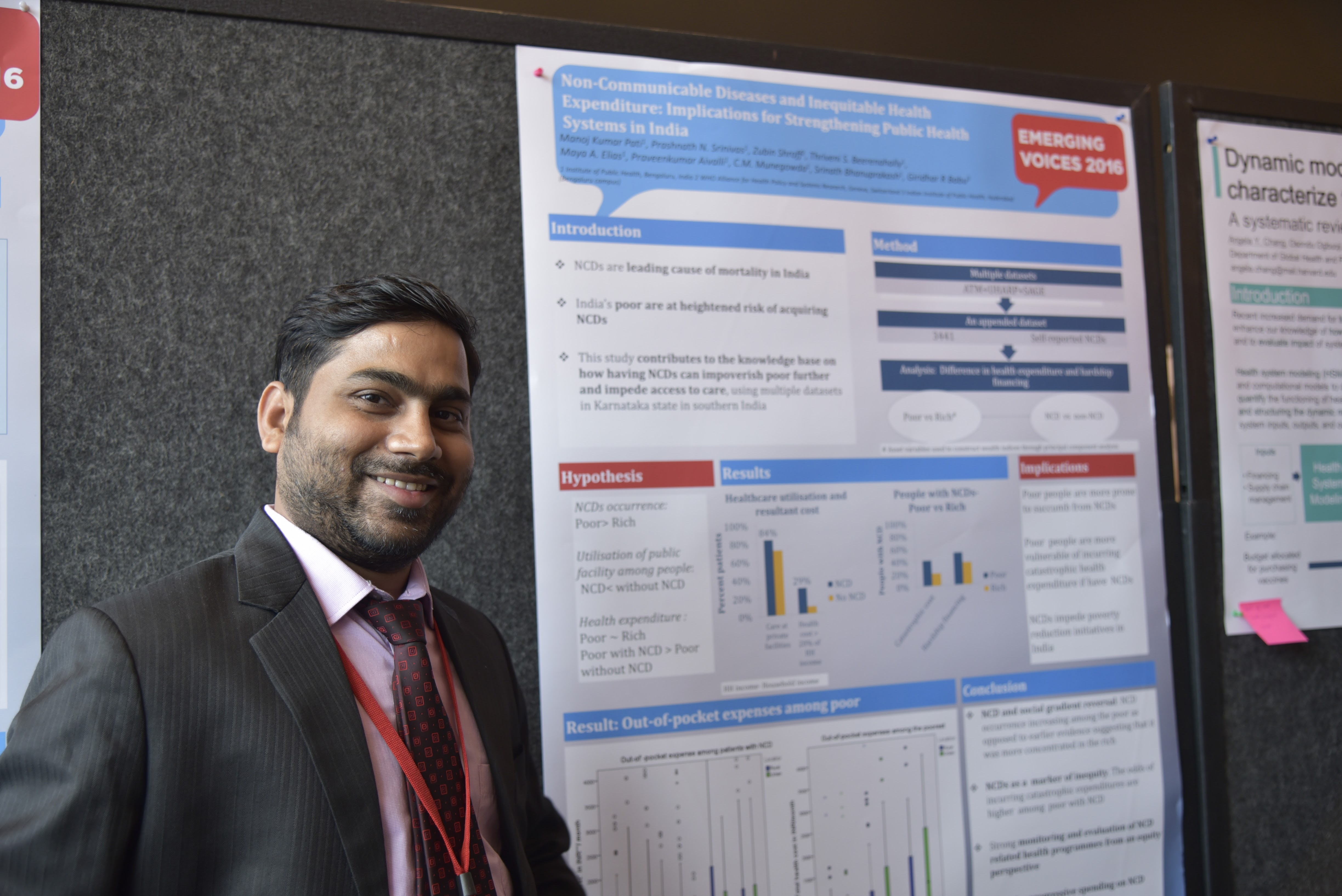 |
| Dr. Manoj Kumar Pati |
| Home
Country: |
India |
| Degree: |
University of Antwerp, Belgium
Doctoral Student, 1st Year (Admission in Process)
Resident Fellowship in International Health Programme, Department of Health Policy, Institute of Tropical Medicine, Antwerp, Belgium
Masters of Public Health in Health Systems Management, SRM University, Chennai, India; Bachelor of Homeopathy Medicine and Surgery, Utkal University, Bhubaneswar, India; Bachelor of Science, Zoology Major, Indira Gandhi National Open University, New Delhi, India
|
Supervisor:
Project Title:
|
Dr. Krishnamurthy Jayanna, Dr. Prashanth N, Dr. Edwin Wouters
How to redesign primary healthcare for improving continuum of care for select noncommunicable diseases (NCDs) in urban India? A realist evaluation approach |
|
|
|
Description of the Project: I am trying to understand how and under what conditions a set of interventions aimed for improving continuum of care at an urban primary health centre would bring improvement (or not) in prevention, management and quality of care for select NCDs (diabetes and hypertension) in Mysuru city, India. Keeping the WHO Innovative Care for Chronic Conditions (WHO ICCC) framework as an initial theoretical framework, organisation of NCD care in urban primary health centres (UPHCs) will be studied in Mysuru city. Given the context, a realist evaluation will be undertaken to understand the mechanisms in which designed interventions would work or not. I will also take this opportunity to examine conditions necessary for UPHCs to implement WHO Package of Essential Interventions for NCDs at primary care in LMICs (WHO PEN) with regards to diabetes and hypertension. |
| |
 |
| Katherine Peña-Valencia |
| Home
Country: |
Florencia, Caquetá - Colombia |
| Degree: |
Universidad de Antioquia, Doctoral student of Microbiology 3rd year
Master’s degree student of Microbiology and Bioanalysis, Universidad de Antioquia, Medellin, Colombia, 2018
Bachelor’s degree. Biologist, Universidad de la Amazonia, Florencia, Caquetá-Colombia- 2017
|
Supervisor:
Project Title:
|
Dr. Zulma Vanessa Rueda Vallejo
Effect of the pulmonary microbiome and its interaction with the immune response on pulmonary function, in a cohort of patients with HIV in Caquetá and Medellin, 2020-2023 |
|
|
|
Description of the Project: My PhD project focuses on the effect of the lung microbiome and its interaction with the immune response on the pulmonary function, in a cohort of patients with HIV in Caquetá and Medellin in Colombia, South America and aims to evaluate the role of the lung microbiome in patients with HIV, and its alteration during acute episodes of tuberculosis and PjP pneumonia. In turn, identify the immunological alterations that occur during the disbiosis of this acute episode, and how this alters gene expression, both in the lung and in the blood. To develop this research, we combined an epidemiological approach with cytokines and RNA sequencing (to study the immune response), and sequencing of the 16S rRNA and 18s rRNA gene to identify the bacterial microbiome and mycobiome. |
| |
 |
| Andrew Plesniarski |
| Home
Country: |
Winnipeg, MB, Canada |
| Degree: |
University of Manitoba, PhD
BSc Honours in Biochemistry from the University of Winnipeg in 2015
Transitioned from Masters in Medical Microbiology and Infectious Diseases to PhD at the University of Manitoba in 2017
|
Supervisor:
Project Title:
|
Dr. Ruey-Chyi Su and Dr. T. Blake Ball
The effect of oxytocin on the inflammatory profile of epithelial cells from the female genital tract and HIV susceptibility. |
|
|
|
Description of the Project: Oxytocin is a neuropeptide hormone produced during both labour and sex that has been shown to reduce inflammation in epithelia from both the gut and the skin. Inflammation has been implicated as a key driver of susceptibility to human immunodeficiency virus (HIV) infection, particularly during sexual transmission. This study seeks to characterize the effect that oxytocin has on epithelia from the female genital tract (FGT), as well as its impact on susceptibility to infection with HIV in both ex vivo peripheral blood mononucleocyte (PBMC) and in vivo humanized mouse models. To test this hypothesis epithelial cells from the FGT will be challenged with Poly(I:C)/LyoVec in the presence or absence of oxytocin, and R5- and X4-tropic HIV strains will be used to infect PBMCs and humanized mice through spinoculation and intravaginal challenge, respectively, in the presence or absence of oxytocin. The expected results from this study are that oxytocin will reduce inflammation in epithelial cells from the FGT, and reduce susceptibility to infection with HIV in both the ex vivo and in vivo infection models. |
| |
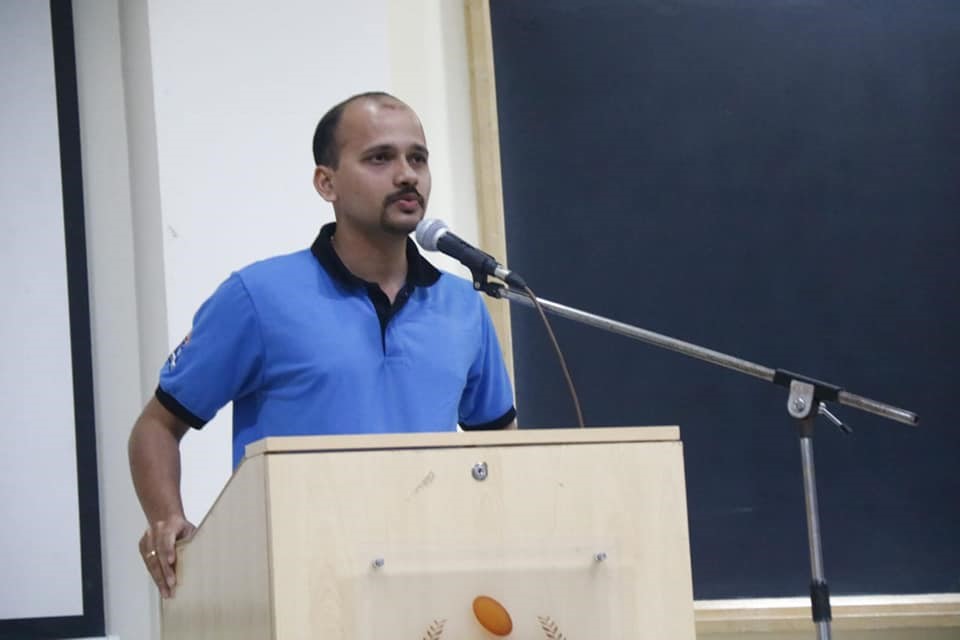 |
| Avinash V Prabhu |
| Home
Country: |
Manipal, Karnataka State, India |
| Degree: |
Ramaiah University of Applied Sciences, PhD, 1 year
M.Sc Optometry (2012-2014) from Manipal University
B.Sc Optometry (2007-2011) from Manipal University
|
Supervisor:
Project Title:
|
Dr. Krishnamurthy Jayanna
Role of technology in the diagnosis and management of Glaucoma in India |
|
|
|
Description of the Project: Glaucoma reports a global prevalence of 3.54%, among which Primary Angle Closure Glaucoma (PACG) is 1.09% in Asia and Primary Open Angle Glaucoma (POAG) is 4.20% in Africa. 111.8 million population is estimated to have glaucoma by 2040. This era of technology, has introduced new and sophisticated techniques in glaucoma detection and management. This has led to the need in identifying the effective technology option in early glaucoma detection and screening at the community level. This work envisages to report the practioners challenge, experience and perspective on glaucoma detection with existing technology. This work attempts to collaborate with one of the startup companies and utilize their innovative & integrated artificial intelligence device (perimetry/fundus photography) in early detection of glaucoma at a community level. |
| |
 |
| Jenniffer Puerta Suárez |
| Home
Country: |
Medellín, Antioquia, Colombia |
| Degree: |
Universidad de Antioquia, doctoral student 2nd year
Microbiologist, Universidad de Antioquia, 2013
Master in biology, Universidad de Antioquia, 2016
|
Supervisor:
Project Title:
|
Dr. Walter Darío Cardona Maya
Prevalence of prostatitis symptoms in Antioquia, Colombia: description of factors associated with an enigmatic disease |
|
|
|
Description of the Project: Prostatitis affects one third of men in reproductive age, their main cause being bacterial infections. For its treatment, broad-spectrum antibiotics are used, this therapy generally fails and promotes the spread of multiresistant microorganisms. In addition, it has been postulated that chronic infections of the prostate may favor the onset of benign prostatic hyperplasia and prostate cancer. Our objective is to determine the prevalence and describe the factors associated with the onset of prostatitis symptoms in men of the Antioquia, Colombia. |
| |
 |
| Juan Carlos Quintero Vélez |
| Home
Country: |
Medellín – Colombia |
| Degree: |
University of Antioquia, Doctoral student in Epidemiology
Doctor Veterinary, University of Antioquia
Husbandry, National University of Colombia
MSc in Animal Science, University of Antioquia
|
Supervisor:
Project Title:
|
Dr Carlos Rojas Arbeláez
Study of the social determinants that influence infection by
Rickettsia in the Uraba region, Colombia |
|
|
|
Description of the Project: Characterize the social and cultural determinants that influence the infection by Rickettsia in people living in endemic areas of the Urabá region, with the purpose of designing public health interventions which are sustainable and consistent with the reality of those affected. We expect to describe social, cultural, genetic, economic, environmental and ecological factors, which are related to rickettsial infection in the Urabá region (Antioquia, Colombia); We expect to identify the social inequalities of the health care system associated with delayed diagnosis and treatment of rickettsial infection. |
| |
 |
| Md Niaz Rahim |
| Home
Country: |
Bangladesh |
| Degree: |
University of Manitoba, PhD,
Medical Microbiology
MSc. in Microbiology, University of Dhaka, Bangladesh
BSc. (Honors) in Microbiology, University of Dhaka, Bangladesh
|
Supervisor:
Project Title:
|
Dr. Kevin M Coombs
Identification of host cellular factors and mechanisms that interact with Influenza A NS1 protein for replication |
|
|
|
Description of the Project: The Influenza A viruses (IAVs) are obligate intracellular parasites and their replication process depends exclusively on host cells. IAV non-structural protein NS1 is a multifunctional protein and essential for viral replication in host cells. Certain group of NS1 interacting host factors may play important role during IAV replication. The goal of my project is to identify host factors that interact with native IAV NS1 using these mAbs and mechanistically determine how some of them affect different IAV growth. We have developed broadly cross reactive anti- NS1 monoclonal antibodies (mAbs) that can detect different epitopes of various types of IAV NS1.I have detected several NS1 interacting host factors and I expect to find few host factors, which will inhitbit IAV replication without interfering host’s normal function. |
| |
 |
| Michael Babu Raj |
| Home
Country: |
India |
| Degree: |
Kuvempu University, Karnataka, Doctoral student
|
Supervisor:
Project Title:
|
Dr. Chandrashekar.E
PPTCT Services: Are We Reaching Out? - From Human Rights Perspective |
|
|
|
Description of the Project: The study identifies areas of concerns and best practices for an effective and sustainable PPTCT program. It documents the primary barriers that hinder access to services and identifies areas where the children and the family play a role in the solution and not just as part of the problem. The study helps in strengthening linkage between care and prevention and further address concerns related to health service system and delivery. The study also explores the infringement of rights of parents and children, that prevent pediatric access to ART (both policy and programming issues) and how these maybe addressed. |
| |
 |
| Carlos Alberto Reina Bolaños |
| Home
Country: |
Cali, Colombia |
| Degree: |
University of Antioquia, Doctoral Student in Epidemiology
Master’s degree in Public Health, Universidad del Valle, Cali, Colombia, 2018
Bachelor’s degree. Occupational Therapist, Universidad del Valle, Cali, Colombia, 2013
|
Supervisor:
Project Title:
|
Dr. María Patricia Arbeláez Montoya
Evaluation of effectiveness of an intervention for the control of one of the ETV transmitted by Aedes in Santiago de Cali, Colombia. |
|
|
|
Description of the Project: Vector-borne diseases are causing increasing levels of morbidity and mortality around the world; mainly in countries with tropical climate. In the case of Colombia, the EGI strategy becomes very important because the Aedes aegypti and Aedes albopictus mosquitoes are responsible for the transition of Dengue, Zika and Chikungunya viruses. This project is an evaluative investigation of the effectiveness of the EGI-ETV on the incidence of dengue in the resident population of the different communities of Santiago de Cali, using a quantitative methodology with a quasi-experimental design of interrupted time series, based on secondary data collected in 2015, 2016, 2017 and 2018. |
| |
 |
| Meika Richmond |
| Home
Country: |
Canada |
| Degree: |
University of Manitoba, PhD
Previous degree: Bachelor of Science Honours, Biotechnology from the University of Manitoba
|
Supervisor:
Project Title:
|
Dr. Frank Plummer and Dr. T. Blake Ball
Polyfunctionality and proliferation of CD8+ T cells in chronic and acute HIV infection |
|
|
|
Description of the Project: Previous work by others and myself have demonstrated that HIV infected subjects who experience slower disease progression maintain better HIV-specific CD8+ T cell proliferation and polyfunctionality compared with normal progressing controls. My research aims at better understanding the polyfunctional and proliferative capacity of HIV-specific CD8+ T cells. I am following newly infected subjects; shortly after seroconversion through to chronic infection and monitoring the changes in the quality of their CD8+ T cell responses over the course of their infection. I am also characterizing novel epitopes found during a previous p24 epitope mapping study that educe polyfunctional and proliferative responses. |
| |
 |
| Carolina Rodríguez Echeverri |
| Home
Country: |
Medellín, Antioquia, Colombia |
| Degree: |
Universidad de Antioquia, Doctoral student of Microbiology
Microbiólogist, Universidad de Antioquia (2016)
|
Supervisor:
Project Title:
|
Dr. Ángel González Marín, MSc, PhD
Hematopoietic and Mesenchymal Stem Cells as targets for Histoplasma capsulatum infection: effects on hematopoiesis, differentiation and proliferation |
|
|
|
Description of the Project: Histoplasmosis is a systemic mycosis of great importance in the world, which mainly affects immunocompromised individuals. In patients with disseminated forms of the disease the bone marrow is affected and is associated with leucopenia, anemia and thrombocytopenia; thus, worsening the clinical outcome. This study aims to determine whether the infection of bone marrow-derived hematopoietic and mesenchymal stem cells from by Histoplasma capsulatum affects hematopoiesis, differentiation and proliferation of these cells. |
| |
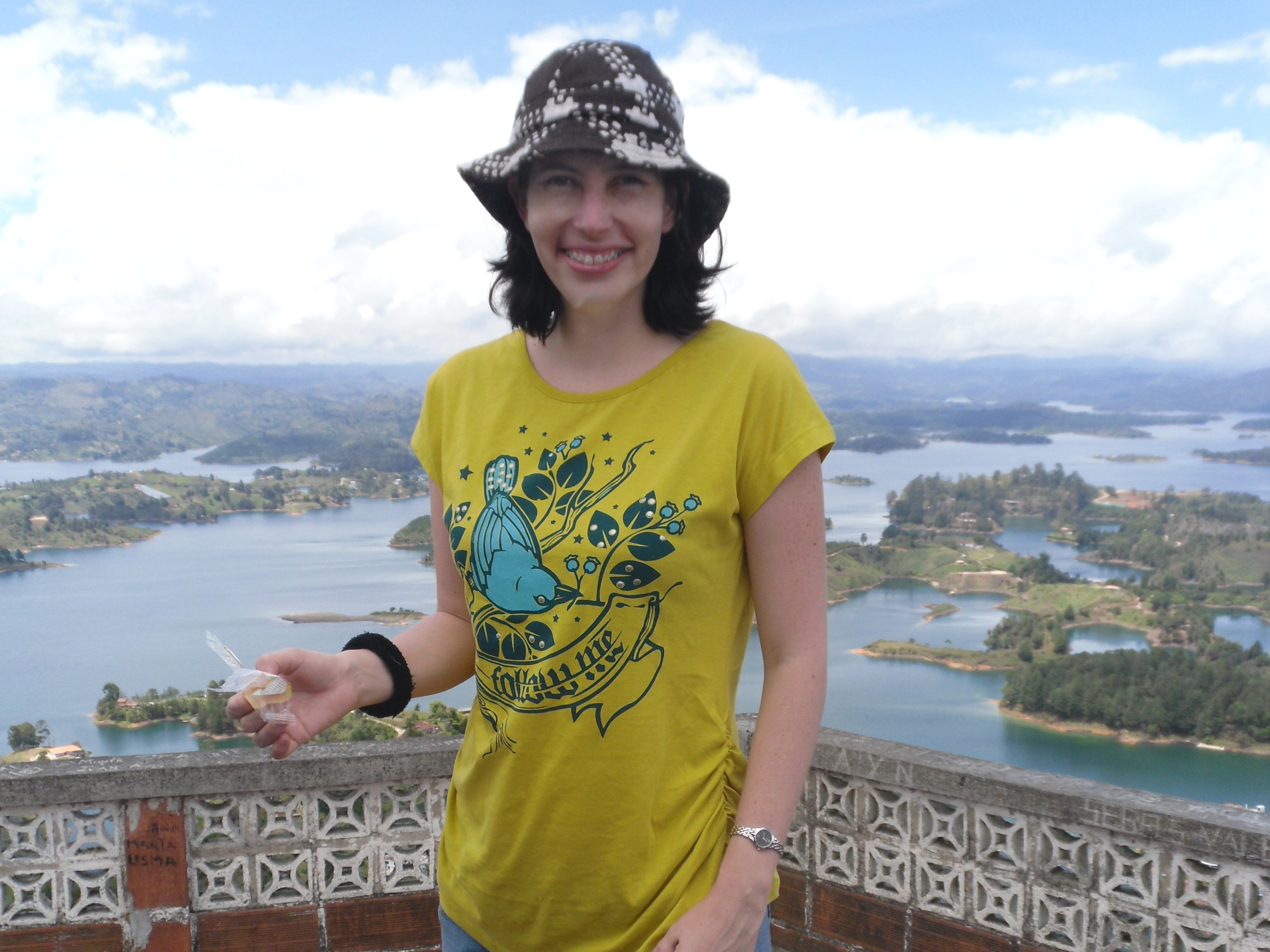 |
| Zulma Rueda |
| Home
Country: |
Colombia |
| Degree: |
University of Antioquia,PhD -Epidemiology
|
Supervisor:
Project Title:
|
Lázaro Vélez, MD. Professor of Medicine
University of Antioquia
Epidemiologic and clinical characteristics of Mycobacterium tuberculosis in prisoners at four different jails. Colombia 2010-2012 |
|
|
|
Description of the Project: Prisons are considered major reservoirs of tuberculosis (TB) and from that point of view, a major threat to public health. In order to get to know the magnitude of the problems in prisons at regions where they will carry out the study and it’s potential impact on public health, we want to investigate: What is the prevalence of sensitive and resistant TB in the prison population? What are the risk factors for TB and those associated with primary and secondary resistance? What are the clinical presentations and outcomes of TB according to the genotypes and resistance patterns identified? |
| |
 |
| Erika Andrea Rodriguez |
| Home
Country: |
Medellin, Antioquia, Colombia |
| Degree: |
University of Antioquia, doctoral student in Biology 3rd year
Microbiologist, Universidad de Antioquia, 2009
Master in Biology, Universidad de Antioquia, 2014
|
Supervisor:
Project Title:
|
Judy Natalia Jiménez Quiceno, MSc, PhD
Study of bacterial communities and antibiotic resistance genes in a wastewater treatment plant (WWTP) in Medellin, Colombia |
|
|
|
Description of the Project: The wastewater treatment plants (WWTP) are considered one reservoir of antimicrobial resistance. Colombia is regarded as an endemic region for some mechanisms of resistance, and this problem has been evidence in Colombian's hospitals. However, there is a limitation in current knowledge about bacteria resistance in the environment and the community. This study aims to determine the behavior of bacterial resistance to antibiotics of clinical importance in a WWTP in Medellin, Colombia. |
| |
 |
| Robert Rutayisire |
| Home
Country: |
Born in Rwanda |
| Degree: |
University of NAIROBI, Doctoral student
BSc in Biomedical Laboratory Sciences
MMLS in Clinical chemistry
|
Supervisor:
Project Title:
|
Dr. Julius Oyugi
Altered cardiovascular risk factors: the association with HIV infection and ART drugs |
|
|
|
Description of the Project: In sub-Saharan Africa, the epidemiological transition toward emerging NCDs linked with lifestyle risk factors raises major concerns to developing countries that need to find the right balance in resource allocation to health programs. This study will explore the impact of antiretroviral therapy on biomarkers of cardiovascular diseases and identify factors associated with these increasing risk profiles, particularly concerning the type and duration of (ART). |
| |
 |
| Satyanarayana |
| Home
Country: |
India |
| Degree: |
PhD, Center for Multi-disciplinary Development Research (CMDR), Dharwad, supported by Indian Institute of Social Science Research (ICSSR), India
|
Supervisor:
Project Title:
|
Dr. V.B Annigari, Professor, CMDR-Dharwad
Migration, Mobility and HIV/AIDS: a comparative study of urban and rural female sex workers in Northern Karnataka, India |
|
|
|
Description of the Project: This project is being conducted on migrant and mobile female sex workers (FSWs) in Bagalkot, Bijapur and Belgaum districts in Northern Karnataka, India to better understand FSWs migration/mobility pattern and to describe the individual, structural, societal and contextual factors that contributes to the risk and vulnerability of urban & rural FSWs. The study will utilize mixed methods approach to meet the research objective and use both secondary and primary data for analysis. |
| |
 |
| Dave
Safronetz |
| Home
Country: |
Canada |
| Degree: |
BSc--University
of Saskatchewan
MSc--University of Manitoba
|
Supervisor:
Project Title:
|
Dr. Michael Drebot
Ecology and biology of Hantaviruses |
|
|
|
Description of the Project: Hantaviruses are an important group
of rodent-borne pathogens, which are associated with two
clinical illnesses in humans: Hemorrhagic fever with renal
syndrome (HFRS) and Hantavirus pulmonary syndrome (HPS).
My research is primarily focused on the characterization
of functional and antigenic domains within the glycoproteins
of disease-causing hantaviruses and evaluating factors effecting
the transmissibility of hantaviruses within a population
of naturally-infected deer mice (Peromyscus maniculatus)
in Manitoba, Canada. The aim of this research is to identify
how and when risk of human exposure to these viruses changes
and to provide insight into potential therapeutic strategies
and vaccines |
| |
 |
| Anitha R. Sagarkar |
| Home
Country: |
Bengaluru, Karnataka, India |
| Degree: |
Faculty of Dental Sciences, Ramaiah University, Doctoral Student
Master’s degree in Public Health Dentistry from Government Dental College
Bachelor’s Degree in Dentistry from Government Dental College and Research
Institute, Bengaluru
|
Supervisor:
Project Title:
|
Dr.Pushpanjali Krishnappa
Effectiveness of Oral cancer health literacy intervention programme
for adolescents at field practice area of an institution |
|
|
|
Description of the Project: India ranks second among all the countries incidence (IARC, 2019),with
highest age adjusted incidence rates (64.8) in the central zone among men and
women for Oral cancer(OC). Low health literacy related to oral cancer is one of the
risk factors, along with early initiation of substances at young age(Sharma et al.,
2018). Hence, our study aims at developing oral cancer literacy tool and intervention,
including implementation strategies among this vulnerable population i.e.
Adolescents. |
| |
 |
| Jisuvei Clayton Salano |
| Home
Country: |
Vihiga, Kenya |
| Degree: |
University of Nairobi, 3rd year PhD student
MSc. Tropical and Infectious Diseases, University of Nairobi
BSc. Biomedical Technology, University of Nairobi
|
Supervisor:
Project Title:
|
Professor Walter Jaoko
Assessment of invasive Group B Streptococcus infection among infants at Kenyatta National Hospital, Kenya |
|
|
|
Description of the Project: Neonatal sepsis is the leading infectious cause of neonatal death in Kenya. At Kenyatta National Hospital, approximately two neonates die each day due to early onset neonatal sepsis (EOS). Majority of these infections have been thought to be caused by Escherichia coli and treated as such. However, the role of Group B Streptococcus in causing EOS at the hospital and country at large has not been fully explored despite evidence from developed countries indicating group B streptococus as the main cause of EOS. The aim of my study is to provide a better understanding on the role of group B streptococus as a cause of early onset neonatal sepsis at KNH. We determine the attack rates for invasive GBS infection in neonates during the first week of life as well as compare the incident rates of early onset neonatal sepsis due to GBS and E. coli among neonates at Kenyatta National Hospital. |
| |
 |
| Vanessa Schulz |
| Home
Country: |
Winnipeg, Canada |
| Degree: |
MSc. 2nd year, Medical Microbiology and Infectious Disease, University of Manitoba
BSc. Honours Biology, University of Winnipeg
|
Supervisor:
Project Title:
|
Dr. Paul McLaren
Identification of HIV escape mutations to a novel host genomic locus associated with control of HIV replication |
|
|
|
Description of the Project: HIV set point viral load (spVL) is known to be associated with and a predictor of HIV progression. There is variability in spVL between individuals which results in variable disease progression that is affected by HIV-host interactions; including genetic variation. Because spVL is a quantifiable clinical marker for disease progression, a host genome-wide association study (GWAS) can elucidate variants that are associated with reduced spVL. A recent GWAS of HIV+ individuals of African ancestry identified a novel host locus on chromosome 1 that is associated with the control of HIV replication. However, despite the presence of protective variants on chromosome 1, some individuals still experience high spVLs. Given the high mutation rate and short generation time of HIV it is hypothesized that HIV is developing escape mutations in response to pressure from variants on chromosome 1. My project aims to identify escape mutations in HIV in response to host pressure through genome-genome analyses. My project will identify significant variants in African populations that can help assess HIV control in communities with varying levels of transmission risk. In addition, this project will identify natural mechanisms of HIV control promoting functional studies towards the development of novel therapeutic and prevention strategies. |
| |
 |
| Juan Aicardo Segura Caro |
| Home
Country: |
Medellín, Antioquia, Colombia |
| Degree: |
Universidad Pontificia Bolivariana, Doctoral student, 4th year
MSc.Biotechnology, Universidad Nacional de Colombia
Animal Scientist, Universidad Nacional de Colombia
|
Supervisor:
Project Title:
|
Dra. Lina Andrea Gutiérrez Builes
Diversity of the family Ixodidae ticks in two livestock subregions of Antioquia: Natural infection, Integrative Taxonomy and analysis of intestinal microbiota and salivary glands |
|
|
|
Description of the Project: Tick-borne diseases are a public health problem in the world. The aims of the project: Identify tick species of the family Ixodidae in two livestock areas of Antioquia, Colombia, South America. Detect the presence of zoonotic microorganisms of the genera Anaplasma, Babesia, Borrelia, Coxiella, Ehrlichia and Rickettsia. And the description of the bacterial communities in salivary glands and intestine with the analysis of deep diversity.
This information will allow us to understand their vectorial capacity, the associated microorganisms, their interactions and the presence of pathogens of zoonotic importance. Information that is key in the implementation of prevention, surveillance and control programs to benefit to human and animal health. |
| |
 |
| Elnaz Shadabi |
| Home
Country: |
Kermanshah, Iran |
| Degree: |
University of Manitoba, Ph.D. Medical Microbiology and Infectious Disease
B.Sc. University of Winnipeg
|
Supervisor:
Project Title:
|
Dr. Ma Luo and Dr. Plummer
Identification and Characterization of Immunologically Relevant T cell Epitopes of HIV-1 Nef |
|
|
|
Description of the Project: Studies have shown that Human Leukocyte Antigen restricted Cytotoxic T Lymphocyte responses play a major role for immune control of HIV infection. To cope with this, the virus undergoes mutations called positive selection (PS), which diminish or escape CTL recognition. Identifying and characterizing these mutations can help select immunogens for candidate vaccines. Nef, an accessory protein of HIV-1 interacts with signal transduction proteins of infected host cell and down regulates CD4 and HLA Class I genes expression on cell surface. Therefore, identification of immunologically relevant T cell epitopes in HIV-1 Nef and correlating them with specific host HLA alleles will help determine the immunogens that can be included in a candidate HIV vaccine. |
| |
 |
| Termeh Shakery |
| Home
Country: |
Rasht, Iran |
| Degree: |
University of Manitoba, M.Sc. in Medical Microbiology and Infectious Diseases
University of Guilan, B.Sc. in Animal Biology, 2022
|
Supervisor:
Project Title:
|
Dr. Lyle McKinnon
Exploring the Bidirectional Relationship Between Vaginal Microbiome and HPV Persistence |
|
|
|
Description of the Project: This project investigates the intricate relationship between the vaginal microbiome and the persistence and clearance of human papillomavirus (HPV) in the female reproductive tract, focusing on the lower tract comprising the vagina and cervix. The vaginal microbiota, when dominated by Lactobacillus species, plays a crucial role in maintaining vaginal health, while shifts toward diverse anaerobic populations are associated with increased risks of gynecological conditions, including cervical cancer. HPV infection, primarily attributed to high-risk HPV types like HPV16, is a major factor in cervical cancer development. Approximately 80% of HPV infections clear spontaneously within two years, but the remaining 20% persist, and this study aims to uncover the mechanisms underlying this persistence, particularly in relation to alterations in the vaginal microbiome and their impact on inflammation, immune responses, epithelial barriers, and the vaginal microenvironment. |
| |
 |
| Souradet Shaw |
| Home
Country: |
Vientianne, Laos |
| Degree: |
BA (Major: Psychology) from the University of Manitoba
|
Supervisor:
Project Title:
|
Dr. James F. Blanchard
Understanding autoimmune diseases: combining traditional epidemiological techniques and complex systems approaches |
|
|
|
Description of the Project: The causes of two related diseases, inflammatory bowel disease (IBD) and multiple sclerosis (MS) are unknown. It has been proposed that a combination of environmental exposures and genetics cause IBD and MS, but the correct combination is still a mystery. Solving this mystery is a great challenge to researchers; part of the challenge lies in the limitations of researchers’ tools. Using administrative data and other existing data sources, this project will combine traditional epidemiologic methods and complex systems dynamic modeling to compare the epidemiology of these idiopathic diseases in different populations. Conceptualizing IBD and MS emergence as a property of dynamic systems expands the analytical capacity of epidemiologists to uncover disease etiology, potentially informing prevention and treatment. |
| |
 |
| Bharatesh Karunakar Shetty |
| Home
Country: |
Manipal, Udupi District, Karnataka, India |
| Degree: |
M.Sc (Health Sciences) with Public Health Specialization, from School of Health Sciences, Pune University, Pune, Maharashtra (1996)
B.Sc (Chemistry Botany and Zoology), Karnataka University Dharwad, Karnataka (1994)
|
Supervisor:
Project Title:
|
Dr.Reynold Washington
Understanding Mental Health Issues among Youth Living with HIV (19 to 25 years) in Belgaum district, Karnataka and Developing Appropriate Counseling Training Curriculum for Counselors in ART Center |
|
|
|
Description of the Project: Mental health is one of the major public health concerns in the global context .It is a critical and neglected global health challenge for adolescents and youths. HIV infected youths who are in the age group between (19-25 years) are more vulnerable to mental health problems. This is less explored and understood in the current context of PLHIV care and support programs in India. Perintally transmitted children who were put on ART during their childhood are now surviving and they are in youth stage (19 to 25 years). Access to ART has helped in prolonging life of children, however their mental health issues not been addressed. Counselors at the facility level are less equipped with skills and knowledge on how to address these issues of YLHIV. The study mainly explores the mental health issues among YLHIV and help them to overcome these challenges. The study also aims to develop appropriate counseling training curriculum for the counselors on how to address mental health issues among YLHIV. |
| |
 |
| Abu Bakar Siddik |
| Home
Country: |
Bangladesh |
| Degree: |
University of Manitoba, PhD student
B.Sc and Master’s degree in Biochemistry and Molecular Biology from the University of Dhaka, Bangladesh. I have also completed my second Master’s degree from the University of Skovde, Sweden.
|
Supervisor:
Project Title:
|
Dr. Ruey Su and Dr. Blake Ball
Impact of Fatty acids in regulating inflammation at the vaginal mucosa by sensitizing cervico-vaginal epithelial cells |
|
|
|
Description of the Project: Epithelial cell layers at the vaginal mucosa need to show tolerance response against commensal microbiome to maintain the symbiosis relation. Different factors presence at the vaginal mucosa such as, metabolites, microbiome, hormones, mucus, cytokines/chemokines etc. always influence host epithelial cells. Among all of these factors, the role of SCFAs and long chain fatty acid in shaping the microenvironment of vaginal mucosa has less studied. So the overall goal of my project is to identify how fatty acids at the vaginal mucosa are involved in the cross-talk between microbes and host cells to maintain the symbiosis relation. |
| |
 |
| Delories Sikuku |
| Home
Country: |
Vihiga, Kenya |
| Degree: |
Master of Science in Medical Microbiology, University of Nairobi, Department of Medical Microbiology and Immunology
Bachelor of Science in Medical Laboratory Science and Technology.
University of Nairobi, Department of Pathology
|
Supervisor:
Project Title:
|
Dr. Marianne Mureithi
Metabolic Uptake Of Natural Killer And Dendritic Cells During Early Hiv Infection |
|
|
|
Description of the Project: Natural Killer Cells and Dendritic cells play a key role in the fight against HIV infection. NKs release perforins; which form pores in the infected cell, and granzymes which cytotoxically kill the cell. On the other hand, DCs are professional antigen presenting cells that recognize pathogens and signal other immune cells to perform their effector immune function. In the contest of HIV, DCs should be able to recognize the HIV, and present them to effector cells which are the NKs for killing. Ideally, fully functional NKs and DCs should be able to curb HIV infection at the point of entry. However, this is not the case. For immune cells to function well during an infection, they need energy for proliferation and cytokine production. Reduced metabolism has been associated with a reduced ability to fight HIV infection. It is therefore important to understand the metabolic uptake and mitochondrial functionality of NKs and DCs in both the peripheral blood and the female genital tract to elucidate what renders NKs and DCs inefficient in battling HIV infection. The study proposes to evaluate the metabolite uptake, mitochondrial potential, and changes in mitochondrial mass of NKs and DCs in both the peripheral blood and the mucosal tissue (uterus) in HIV pathogenesis. |
| |
 |
| Aida Sivro |
| Home
Country: |
Zenica, Bosnia and Herzegovina |
| Degree: |
University of Manitoba, PhD
|
Supervisor:
Project Title:
|
Frank Plummer and and Dr. T.B. Ball
The Role of IRF-1 Polymorphisms in susceptibility to HIV-1 Infection |
|
|
|
Description of the Project: This project involves studying naturally occurring variants of IRF-1 gene, transcriptional regulator and an important player in developing proper host immune responses against HIV-1 infection. Individuals with the ‘protective’ IRF-1 variant have significantly lower chance of getting infected with HIV virus. We are interested in further determining what effects do different IRF-1 gene variants have on HIV-1 replication and the development of host immune responses. |
| |
 |
| Joyce Slater |
| Home
Country: |
Canada |
| Degree: |
MSc--Community
Nutrition
University of Manitoba
|
Supervisor:
|
Dr. John O'Neil
|
|
|
|
Description of the Project: My research project focuses on
the Canadian food system and its impact on health and illness,
in particular childhood obesity. Substantial changes to both
the food system and food consumption patterns over the last
30 years have resulted in unanticipated outcomes such as
new pathogens in the food supply, obesity and chronic diseases.
Understanding the social and structural influences on the
food system and dietary patterns has implications for how
we understand and address both infectious and chronic illness. |
 |
| Heather Smith |
| Home
Country: |
Canada |
| Degree: |
BSc
Microbiology--University of Manitoba |
Supervisor:
Project Title:
|
Dr.
D.J. Hoban
Molecular Characterization of Fluoroquinolone Resistance
in Streptococcus pneumoniae |
|
|
|
Description
of the Project: pneumoniae:
chromosomal mutations and efflux. I conduct my research on
two groups of isolates: clinical isolates our lab receives
as part of a Canada-wide antibiotic resistance in respiratory
organisms’ surveillance study and laboratory mutants that
I have generated. We are investigating how different fluoroquinolones
are affected by the various phenotypes/genotypes of S. pneumoniae
that are observed in clinical isolates.. |
|
|
 |
| Melissa Smith |
| Home
Country: |
Canada |
| Degree: |
U of Manitoba, PhD, Medical Microbiology
Bachelor of Science from the University of Regina |
Supervisor:
Project Title:
|
Dr. Blake Ball and Dr. Frank Plummer
Heterogeneity in Progression to AIDS: The Role of Antigen Specific CD8+T cell |
|
|
|
Description of the Project: After initial infection with HIV, some individuals progress to AIDS more quickly than average (Rapid Progressors), and others more slowly (Long-term non-progressors). This study is being carried out on a group of female sex workers in Nairobi, Kenya, to assess the role that CD8+ cytotoxic T cells may have in delaying progression to AIDS. CD8+ T cells will be evaluated based on their ability to suppress virus in vitro, secrete cytokines, proliferate, and by which T-cell receptors are preferentially utilized. This study will help to shed light on what some of the natural protective responses are against HIV, and thereby help to inform vaccine or treatment design.
|
 |
| Derek Stein |
| Home
Country: |
Canada |
| Degree: |
University of Manitoba, P.hD. |
Supervisor:
Project Title:
|
Dr. Frank Plummer and Dr. Blake Ball
Mass Spectrometry based characterization of HIV-1 resistance in the female genital tract
|
|
|
|
Description
of the Project: The world is in desperate need of an effective HIV-1 vaccine and models of protective immunity. In Nairobi, Kenya a group of commercial sex workers have been characterized, who, despite repeated exposure to HIV-1, remain uninfected. Globally, most HIV exposures occur in the female genital tract (FGT) during heterosexual contact, leading our group to hypothesize that immune defenses acting at the genital mucosa may be contributing to their ability to resist HIV infection. This thesis hypothesizes that lymphocytes in the FGT of HIV resistant women have distinct functional and phenotypic properties when compared with women who have a relatively low-risk of becoming infected and that this may be playing a significant role in mediating resistance to HIV infection. Using a mass spectrometry based approach we are able to compare the proteome expression differences between these groups to discover biologically relevant markers of HIV resistance in the FGT. A better understanding of how HIV is naturally repelled will have important implications for the design of vaccines and microbicides needed to slow the HIV pandemic. |
 |
| Michael Stobart |
| Home
Country: |
Canada |
| Degree: |
B.Sc. Honors Co-op First Class Honors (U of Manitoba)
U of Manitoba, doctoral student 5 year. |
Supervisor:
Project Title:
|
Dr. J. David Knox
Identification of Non-Essential Host Genes Required for PrP106-126 Mediated Neurotoxicity
|
|
|
|
Description
of the Project: Prion diseases are invariably fatal neurodegenerative disorders that result from aggregation of an infectious isoform of an endogenous protein. The mechanism of neurotoxicity remains elusive, in large part due to the lack of a satisfactory cell culture model that mimics disease pathogenesis. I have developed a model that results in apoptosis of human neuroblastoma cells when exposed to a peptide derived from full-length prion protein, with cell death averaging 99% compared to a control peptide. Using this model, I have screened a shRNA library consisting of 73,000 molecules, and so far, have identified 46 genes that appear to be essential for prion-mediated neurotoxicity. Quantification of the expression levels of these genes in brains from infected and control mice indicates that a large portion represent potential disease biomarkers, with confirmation of their potential currently underway in kidneys. |
| |
 |
| Tammy
Stuart |
| Home
Country: |
Canada |
| Degree: |
BSc
--University of Manitoba
|
Supervisor:
Project Title:
|
Dr.
Frank Plummer/Dr.Kevin Koombs
Professor, Medical Microbiology, University of Manitoba
HIV-1 superinfection and HLA driven Evolution |
|
|
|
Description
of the Project: Superinfection can be defined
as the HIV infection (with the same or different subtype)
of an individual who already has an established HIV infection.
The question is raised as to whether infection with HIV
has a protective effect against a subsequent infection
with another HIV-1 virus. The ML cohort is an ideal one
to study this question because of the high HIV incidence
and prevalence, the number of unprotected exposures and
the diversity of circulating viral subtypes. My project
also involves studying the effects of HLA class I on
viral evolution over time within the protease gene. |
| |
 |
| Natalia Taborda |
| Home
Country: |
Colombia |
| Degree: |
University of Antioquia, PhD- basic sciences |
Supervisor:
Project Title:
|
Dr. María Teresa Rugeles
Evaluation of genetic and immunological mechanisms involve in resistance to HIV-1 exhibited by chronically infected individuals who control viral replication without antirretrovirals |
|
|
|
Description
of the Project: There are two new phenotypes of HIV-1 positive individuals who exhibit a spontaneous and sustained control of viral replication at least for one year without antiretroviral therapy (HIV-1 controllers). Considering that these patients were recently described, and the mechanisms related to the control of viral replication are poorly studied we have focused our research attention on this population. We want to establish the association between spontaneously control of HIV-1 replication and the following factors in peripheral blood and gut-associated lymphoid tissue: i) Frequency of immune cells; ii) immune hiperactivation status; iii) soluble proteins with anti-HIV-1 activity; iv) cytotoxic activity of NK cells and CD8+ T cells; v) presence of HLA alleles and vi) expression of human killer immunoglobulin-like receptors (KIR).
|
| |
 |
| Mallika Tharakan |
| Home
Country: |
Mysore, Karnataka, India |
| Degree: |
Kuvempu University, Karnataka, India, PhD Student
|
Supervisor:
Project Title:
|
Dr. Shajy Isac
Changing engagement of women in agriculture and its association with consumption patterns and nutrient intake in rural Karnatakas |
|
|
|
Description
of the Project: For an estimated 72% of the 1.1 billion people who live in rural India, agriculture is a way of life. Agriculture in India defines familial tradition, social relations and gender roles. Female in the agricultural sector, whether through traditional means or industrial, for subsistence or as an agricultural labourer, represents a momentous demographic group. In rural India, the percentage of women who depend on agriculture for their livelihood is as high as 84%. With globalization and liberalization, the agricultural economy has experienced shifts and changes and so has the nature of involvement of women in agriculture. Modernization and mechanization has brought many paradoxical situations for the poor household women. Though there have been several studies to understand the changing patterns of the agrarian economy and women’s participation in agriculture, studies have not been really undertaken to explore the link between women’s participation and their nutrient intake. My research is aimed at understanding the current pattern of women’s engagement in agricultural sector in rural India; examining the changing patterns in the engagement of women over a period of time; and exploring how shifts in engagement patterns has influenced or resulted in changes in consumption models and nutrient uptake among these women.
|
| |
 |
| Laura Hilary Thompson |
| Home
Country: |
Canada |
| Degree: |
U of Manitoba, Department of Community Health Sciences, PhD
Honours BSc (microbiology, human biology, and anthropology) - University of Toronto
MSc - Community Health Sciences at the University of Manitob
|
Supervisor:
Project Title:
|
Dr. James Blanchard
HIV epidemic diversity among high risk populations in Pakistan |
|
|
|
Description
of the Project: Pakistan has substantial heterogeneity in HIV prevalence and risk behaviors in different geographic areas and among different high risk populations. HIV prevalence has reached 50% among injection drug users in some areas and is recently beginning to appear among sex workers. Little is understood about the diversity and trajectory of HIV epidemics in Pakistan. My research will investigate and characterize HIV transmission chains in Pakistan using molecular, behavioural and social network data. This will provide a uniquely comprehensive understanding of the heterogeneity and population dynamics of HIV subepidemics in Pakistan, which will be critical to strategically design targeted HIV prevention programs.
|
| |
 |
| Riley Tough |
| Home
Country: |
Winnipeg, Canada |
| Degree: |
Doctoral student, Medical Microbiology and Infectious Diseases, University of Manitoba
BSc Honours Genetics at the University of Manitoba
|
Supervisor:
Project Title:
|
Dr. Paul McLaren, Co-supervisor Dr. Blake Ball
Computational and Functional Characterization of a Novel Genomic Locus Associated With Decreased HIV Set-Point Viral Load |
|
|
|
Description
of the Project: HIV setpoint viral load (spVL), the amount of viral RNA found in the blood of individuals during latent phase of infection, is a strong predictor of disease progression rate and transmission risk. Many factors contribute to spVL levels, which can vary over several orders of magnitude between people, including host genetic background. In a recent genome-wide association study of HIV spVL, our group detected a novel association signal on chromosome 1 in 3,100 individuals of African ancestry. My project is to characterize the region of the genome to determine the functional characteristics and the impact of specific host genotypes on HIV disease progression.
|
| |
 |
| Degol Dessie Tsegai |
| Home
Country: |
Keren, Eritrea |
| Degree: |
U of Manitoba, Masters of Public Health (MPH)
MD - Orotta School of Medicine and Dentistry, in 2011
Advanced Diploma in HIV Management at the College of Medicine of South Africa (2017)
|
Supervisor:
Project Title:
|
Dr Michelle Driedger
Facilitators and Barriers of Successful Tuberculosis Treatment Outcomes at Qacha’sNek District, Rural Lesotho: A Mixed Method Study |
|
|
|
Description
of the Project: Lesotho is one of the countries hardest hit by the double burden of HIV and Tuberculosis (TB), with the latest (2021) HIV prevalence estimated to be 20.9%, whereas TB incidence at 650/100,000. Tuberculosis (TB) is one of the top ten causes of morbidity and mortality in Lesotho. The rate of initial TB treatment defaulters ( before treatment initiation) in Lesotho is high at 22% coupled with absence of an effective tracking system. Several factors determine TB treatment outcomes including patient factors, socio-demographic factors and system factors including health care system. There is significant disparity in TB treatment success rate between urban and rural Lesotho at 74% and 66% respectively. The purpose of the current study is to identify factors that facilitate or inhibit successful TB treatment outcomes for clients who received TB treatment during the period of January 2020 to December 2022 at Qacha’sNek district in rural Lesotho.
|
| |
 |
| Brahian Camilo Tuberquia López |
| Home
Country: |
Frontino, Antioquia, Colombia |
| Degree: |
University of Antioquia, doctoral student
Masters of Veterinary Sciences, Universidad de Antioquia, 2021
Bachelor of Veterinary Medicine School, Universidad de Antioquia, 2017
|
Supervisor:
Project Title:
|
Nathalia Correa Valencia, DVM, MSc, PhD
Epidemiology of the use of antimicrobials in bovine dairy herds in the northern region of Antioquia with projection to comparable national data. |
|
|
|
Description
of the Project: Quantifying antimicrobial use (AMU) is important to measure the effectiveness of intervention programs, to identify associations between use and resistance, to compare populations, and for comparison purposes. Monitoring AMU in dairy cattle is becoming common in a growing number of countries, with the ultimate goal to improve practices, reducing the development of antimicrobial resistance, and protect human health. The aim of this study is to determine the epidemiological dynamics of AMU in bovine dairy herds in the northern region of Antioquia.
|
| |
 |
| Thérèse Umuhoza |
| Home
Country: |
Rwanda |
| Degree: |
PhD tropical and infectious diseases program
Bachelor’s Degree, Mass Communication, Mount Carmel College, Bangalore, India
|
Supervisor:
Project Title:
|
Prof. Bulimo Wallace and Dr. Oyugi Julius
A retrospective investigation of acute viral respiratory infections, epidemiology, clinical characteristics and associated factors in Kenya (2007-2012) |
|
|
|
Description
of the Project: Acute respiratory infections of viral origin are recognized the top leading cause of morbidity and mortality in young children, mostly in developing countries. Recent studies indicated that other age groups are affected as well. My project focus on understanding the epidemiology of infections caused by respiratory viruses named respiratory syncytial virus, human parainfluenza and adenoviruses in a Kenyan population.
|
| |
 |
| Johanna M. Vanegas M |
| Home
Country: |
Medellín, Colombia |
| Degree: |
University of Antioquia, doctoral student 4 year, Epidemiology
Microbiologist, master in Microbiology. University of Antioquia
|
Supervisor:
Project Title:
|
Judy Natalia Jiménez Quiceno, MSc, PhD
Colonization and development of infections due to multidrug- resistant bacteria in a cohort of patients in hemodialysis |
|
|
|
Description of the Project: Multidrug-resistant bacteria have emerged as important causes of healthcare-associated infections. Hemodialysis patients are a group particularly affected by these microorganisms, with colonization and infection rates often exceeding those seen in persons with other types of healthcare exposure. My thesis aims to analyze the effect of colonization by multidrug-resistant bacteria (S. aureus and betalactamase-producing Gram-negative bacteria) in the development of bacteremia in hemodialysis patients. |
| |
 |
| Gloria Vázquez Grande |
| Home
Country: |
Spain |
| Degree: |
University of Manitoba, PhD student 5years
MD, specialty - Critical Care; MSc in the department of Medicine at Universidad Autónoma de Madrid
|
Supervisor:
Project Title:
|
Dr. Kumar
Effect of antibiotic sequence on bacterial clearance in a rat model of peritonitis-induced septic shock |
|
|
|
Description of the Project: Using a rat model of septic shock, I want to find out whether the sequence in which we give antibiotics in combination can affect efficacy (bacterial kill).
I am using a synergistic combination of antibiotics, where one of them has a post antibiotic effect - stops bacteria from reproducing for a certain period of time after it’s given - and the other agent only works while the bacteria are duplicating.
If we find out that there is better bacterial kill with a certain sequence, we can probably optimize the treatment of septic shock with a simple intervention. |
| |
 |
| Jill Waruk |
| Home
Country: |
Canada |
| Degree: |
MSc--University of Manitoba
|
Supervisor:
Project Title:
|
Dr. Frank Plummer
Epitope mapping and characterization of
the binding site of monoclonal antibodies on HIV-1
gp120 |
|
|
|
Description of the Project: To date, the majority of successful vaccines target
antibody responses in humans. A successful HIV
vaccine will likely require an antibody-generating
component. Epitope mapping of antibodies capable of
blocking HIV-1 infection will reveal specific protein
sequences involved in HIV-antibody interactions. We
hope to discover these interactions and to create a
vaccine that will elicit in humans neutralizing
antibodies as powerful as those we study in the lab. |
| |
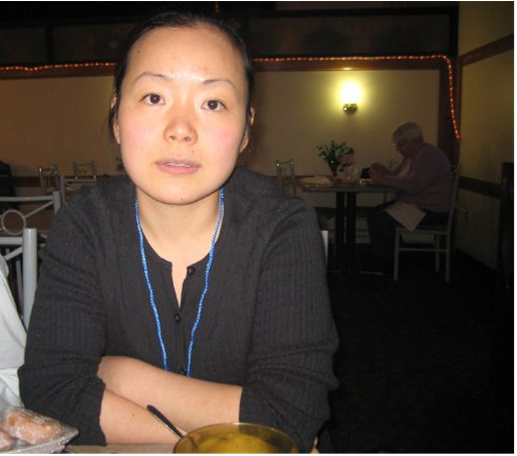 |
| Yingfeng Zheng |
| Home
Country: |
Fuzhou, China |
| Degree: |
Msc, Fujian Medical University, China |
Supervisor:
Project Title:
|
Dr. Xiaojian Yao
Functional role and molecular mechanism underlying the interplay of HIV-1 integrase with host cofactors |
|
|
|
Description
of the Project: HIV-1 utilizes many host cellular cofactors to optimize its replication lifecycle. My project focuses on investigation of molecular mechanisms underlying the early stage of HIV-1 replication, especially on HIV-1 integrase/cellular protein interactions required for HIV-1 DNA nuclear import, chromatin targeting and integration. Blocking the key virus-host interaction would provide new strategies for antiviral therapy.
|
|
|

|

